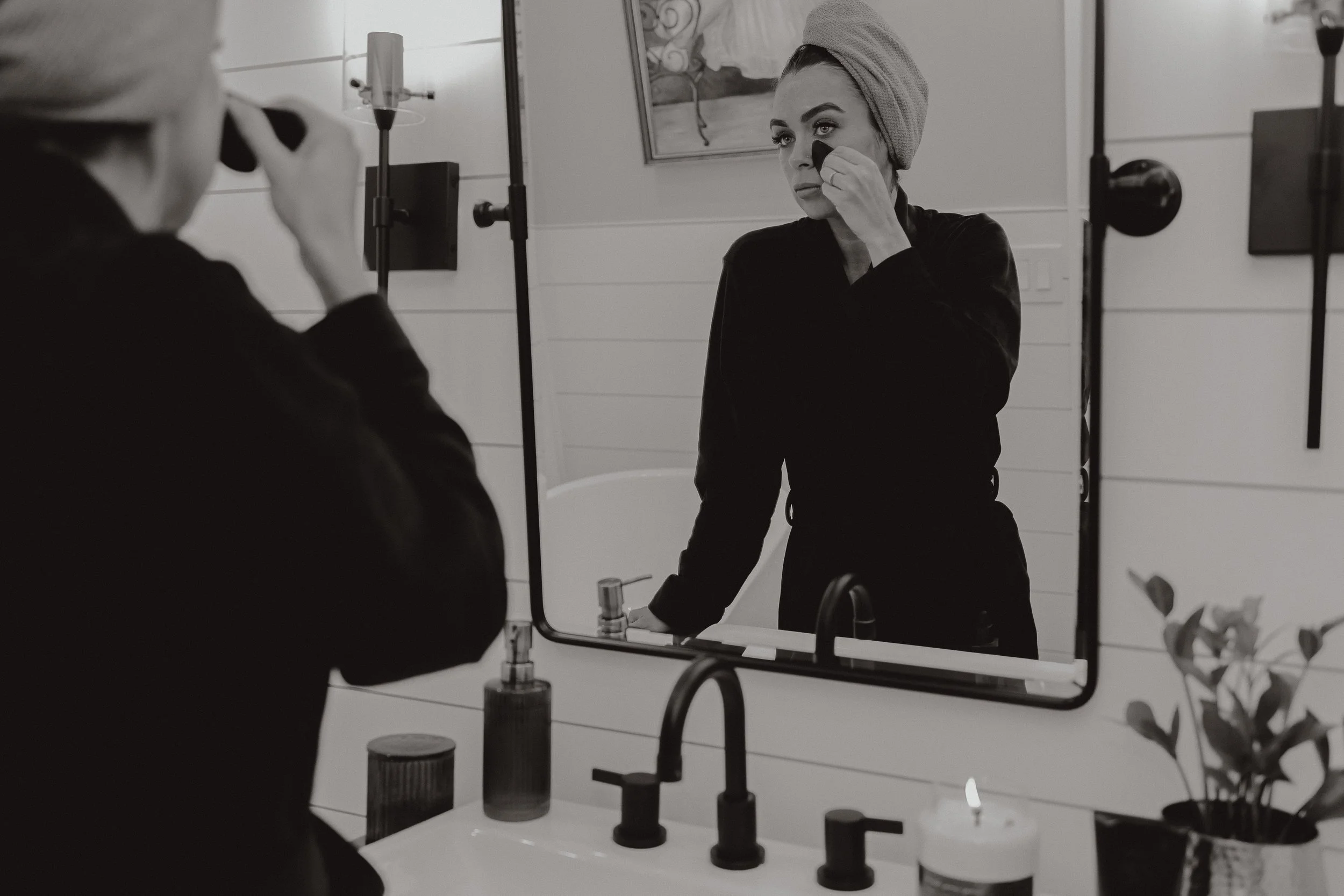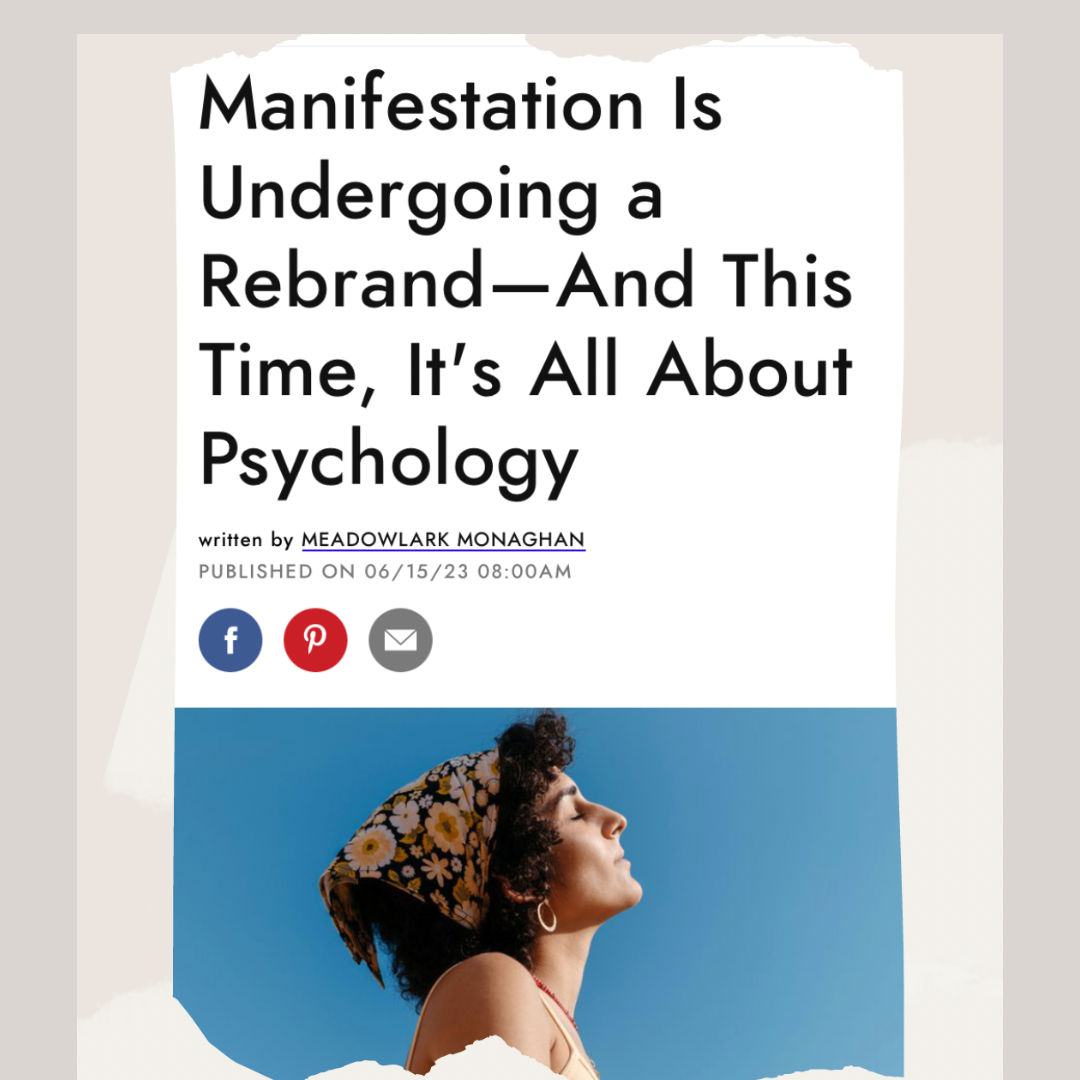Self Sabotaging Behaviors (Identify & Eliminate Your Self Sabotaging Ways)
I suppose it could seem pretty obvious what the term “self sabotage” means. However, sometimes self sabotage is sneaky. There could be ways that you’re holding yourself back or “self sabotaging” that you have no conscious awareness around.
For anyone whose unaware of their self sabotaging ways or for those aware, yet stuck in the grip of their own self destruction; this one’s for you.
My goal is to bring any sort of conscious or unconscious form of self sabotage that you may be engaging in to the surface in order for you to clear it out. Without self sabotaging behaviors in the way you can proceed forward in your life with more ease and clear intention. Within this article you will find perspectives and reflective questions to help you overcome any resistance that’s keeping you from taking positive action toward change.
Let’s define it: What’s self sabotage?
Self sabotage is created by any actions or inaction that’s stunting your progress toward the things you want. Self sabotage is how you hinder your own potential and future success.
Why do you self sabotage?
There can be many reasons why you engage in self sabotage; here’s a few:
Low self-esteem
Insecure attachment styles
Fear of failure, disappointment, commitment
Unhealthy belief systems around relationships, life, love, career, self, etc
Unhealthy coping skills in relationships & life matters
2 Reasons Why You’re Stuck in Self Sabotage
1. Lack of Ownership / Self Responsibility
In a nutshell you stay stuck in self sabotage when avoiding taking ownership or responsibility for your inaction or actions becomes your pattern. Lacking the want or ability to see your part in any obstacle, keeps you stuck in behaviors and habits that hinder your ability to move forward.
With a lack of self ownership leading; you tend to see problems as being outside of yourself. With this perspective, it’s common to point the finger to the fault of external circumstances. It’s the fault of the job, the weather or the other person involved. Basically, the fault of anything tends to be everything else but something that you can potentially own and take responsibility for.
change: Taking a hard look at your life, your circumstances and accepting that there’s responsibility to own in how events and, ultimately, life is unfolding to some degree is a major shift to get beyond self sabotage.
Gaining self responsibility will help us to see our problem areas and allow us to begin to work on accepting and changing our ways.
With self compassion and kindness leading; I invite you to reflect on the ways that you might be lacking or avoiding taking ownership of areas in your life that feel stagnant, unfulfilling or a source of unhappiness.
2. Attachment to Negative Perspectives, Stories or Beliefs
When you’re mentally, emotionally or physically attached to something negative, you tend to unwittingly and consistently behave in ways that cause unhealthy decision making and general unhappiness. In a nutshell, what you’re attached to dictates the ways in which you make choices and decisions about your life.
Any beliefs that you have around not being capable enough, good enough or smart enough will hold you back from going toward what you really want.
Negative beliefs about yourself will keep you stuck in your self sabotaging behaviors. Negative stories about others and the world will do the same. Attachment to anything that is draining your life force energy and holding you back from being your best is something to do some reflection on.
change: Reflecting on the beliefs, stories and perspectives that could be holding you back and working to shift and eliminate negative ways of seeing the world can help you greatly.
*Find my post to help you identify and sort out any limiting beliefs HERE.
Examples of Self Sabotaging Behaviors
lack of self responsibility: waiting for others to present you with the opportunities to achieve happiness or success instead of creating them yourself.
rumination: spending your time picking apart your worries & doubts vs focusing on productive thoughts and actions that can help you toward fulfilling your potential.
resistance: having the inner knowing of what you need to do, yet lacking the motivation or ability to take positive action.
perfectionism: needing things to look or be a specific way; usually the result of setting unrealistic expectations of a goal.
justification: allowing your excuses to prevail over your dreams. Giving your excuses and justifications more energy than taking the necessary action toward what you actually want.
disorganization: we’ve all heard it before: messy house; messy mind. The condition of our external space impacts our mental clarity. Too much stuff or a disorganized space doesn’t create the backdrop for a productive and peaceful living environment. There’s much clarity in organization.
A read to inspire you to declutter HERE.
uprooting; making constant life changes that don’t allow for appropriate follow through toward commitments. The pattern with uprooting is constant change that keeps you from actually settling in anywhere or with anything. The constant coming and going is a barrier to long term success.
fear of failure: holding so much fear around things not working out to the point where you shut ideas down before they have a chance to succeed. Fear around failure can stop you from beginning any process of putting yourself “out there” and trying.
As long as we’re trapped in the confines of fear around failing we’ll have dreams that will remain unborn.
How to Heal: Establish a Microshift Mindset
A microshift mindset helps you learn to slowly introduce and implement new habits, while working toward defining and eliminating ones that no longer serve you. Over time, these “microshifts” create long lasting and impactful change that leads to a better quality of life.
Reminder: Big change often happens little by little
Ultimately, doing the deeper work to change any belief systems, irrational fears, face insecurities or negative associations that keep the root of the issue alive will be “the work” that releases you from your own self destructive ways.
Reflection Questions for Growth and Healing
In what ways might you be engaging in self sabotaging behaviors? look beyond the obvious. What behaviors or actions that at first glance might seem benign, but actually are self sabotaging? Take a moment to reflect.
What beliefs, ways of thinking or actions do you engage in that work against you and keep you limited? look for patterns and ways of being that are mindless and conditioned. (the things you “just do” without thinking.
What do you find yourself complaining about or feeling negative emotions around? look toward areas where there’s feelings of unfulfillment or boredom.
Remember that shifting and changing your ways will bring discomfort. Discomfort is present even with positive growth and change. Therefore, be mindful not read too much into the discomfort that you will feel along your self growth journey.
Instead of pushing uncomfortable emotions away; Breathe through them. Allow them to be with you.
You don’t have to like the presence of discomfort, but learning to tolerate the feeling as it accompanies you on your journey from time to time will help any uncomfortable feelings pass through with more ease and less struggle.
Resources for Further Introspection
The Mountain is You / book
The Mountain is You / workbook
*Above image by photographer Amy Lynn Bjornson.
3 Limiting Beliefs That Are Making You Unwell (How to Ditch Them)
We hear a lot about limiting beliefs; it can easily go in one ear and out the other. However taking the time to reflect on the limiting beliefs that might be holding you back is worth while introspection.
The focus in this post will be on 3 specific limiting beliefs that can affect how we show up, what (ultimately) happens and how we feel in the world.
ready? let’s go.
I don’t know about you, but I can dwell, overthink, engage in my own pity party, be a victim of my circumstances, ruminate about past decisions and have rose colored lenses about the past, which all leads to feelings of enormous regret and feeling awful.
When I’m in these murky internal spaces, it serves me to unpack where my head’s by checking in with my belief system. I, like anyone, has to watch what I do with the pains, struggles, trails and tribulations that life sometimes serves that not only I experience on a personal level, but happen and impact us all on a global level as well.
How about you? Do you relate to getting stuck in the ways I described above? If so, this post is for you.
It can feel impossible to change the way we perceive and experience our reality. Especially when our reality is filled with circumstances or people that are challenging or a negative mindset that we just can’t shake.
This is where I’m going to introduce the concept of mental strength. Mental strength points towards our level of resiliency. Our level of mental strength dictates how healthfully we can get through and overcome hardship.
The truth is that our mental strength is like physical strength; It can become stronger by “working it out” with focused intention and practice. A consistent mindfulness practice around the quality of our beliefs and thoughts can create positive change around unhealthy thinking patterns.
Let’s get into the 3 specific limiting beliefs that can be keeping you stuck.
3 Beliefs That Can Keep You Stuck
1. unhealthy beliefs about ourselves
examples:
“I’m not good enough.”
“Nobody ever picks me.”
“I’ll never be successful.”
“I’m not smart enough, young enough, old enough, good looking enough, healthy enough..…”
“I don’t have enough experience.”
“I’m not capable.”
2. unhealthy beliefs about others
examples:
“You can’t trust anyone.”
“Everyone is out for themselves.”
“Other people always let you down.”
“People are so manipulative and fake.”
3. unhealthy beliefs about the world
examples:
“The world is nothing but a dangerous & dark place.”
“It’s impossible to be successful in this world today.”
Can you see, if those were your core beliefs, how there’s no way that you could show up light hearted, fulfilled and happy? Those beliefs hold too much heavy, black & white, conclusive, bleak and hopeless energy to allow one to feel and experience joy.
The truth is that:
there are times were you will come across people who are not to be trusted. There will be experiences that show the unfairness that the world is capable of. There will be people that disappoint and hurt you.
That’s life. I don’t say that lightly; I say that, with heart & empathy, to reflect the reality that is our world at times.
It’s a hard truth, but it is truth.
There’s contrast in life. There’s so much beauty and there can be so much pain. Two truths that are opposites of one another existing.
What you have choice about is the perspective that you choose to take as life events play out and unfold. Your beliefs about the world will define your perspectives, your thoughts, your mood, your actions and, ultimately, how your life pans out.
As we might have heard already; our beliefs create our thoughts, which affect our actions, that ultimately create what our reality looks and feels like.
Spending time to identify if any negative beliefs are holding you back and working toward seeing yourself, others and the world with a neutral lens will help you to have a more balanced and healthy perspective about your present reality.
As you do discover negative beliefs that you hold, countering those negative beliefs with experiences that you have had (or can think up) that show a different story (a more positive reality) could be extremely helpful to help you reset.
Getting clear on what your beliefs are around yourself, others and about the world can help you identify if there’s anything to clean up and clear out of your mental space that’s holding you back from feeling generally lighter and more fulfilled.
*Spending time journaling and reflecting upon your limiting beliefs can be valuable for you. A helpful exercise is countering unhealthy beliefs with healthy ones.
*For this exercise: Take a sheet of paper, split it in half, on one side of the paper write your negative belief and on the opposing side counter that negative belief with a more factual, neutral and healthy way of thinking.
General Ways of Thinking that Keep us Stuck
Why is this happening to me? This thought encourages dwelling, rumination & self pity.
Why can’t I (fill in the blank) …….? This thought feeds comparison, not feeling good enough, decreases confidence and motivation to change and take positive action.
What’s wrong with me? What’s wrong with the situation or circumstance? This thought focuses on the perceived problem and can lead to distorted thinking, while focusing your energy onto something unproductive.
Ways Toward Healthier Thinking Patterns & Beliefs (3 tips)
1. Practice Mindfulness
Tap into your your “wise mind” (your inner knowing, your logic based mind that see’s things and experiences with more clarity vs. your “emotion mind.” Your emotion mind responds and reacts based on feelings. Feelings aren’t necessarily truth; they’re just feelings. They are valid, but not always factual. Anytime we don’t allow ourselves to see a situation for what it truly is; is something to watch.
To untangle which is which and become more mindful ASK:
“Which mind is talking here, my wise mind or emotion mind?”
*wise mind & emotion mind are DBT (Dialectical Behavioral Therapy) Concepts. Look HERE if you’re curious to learn more about DBT.
2. Have Hope
It’s so important and healthy to hold out hope that life could get better. Without hope, what do we have? I have two points to clarify here:
what hope is not; fairy tale thinking, avoidance of reality.
what hope is; allowing the future to be neutral without our judgements, fears & distorted beliefs getting all over what has not been written.
3. Aim for a Physically & Mentally Well Lifestyle
A consistent focus and practice of good habits /body, mind, heart, soul / and ways of thinking in order to be/stay physically & mentally strong will help you greatly to achieve more balance and general wellness.
3 Closing Journal Prompts:
1. What bad mental habits are holding you back?
2. What unhealthy beliefs are keeping you from being mentally strong?
3. What is one small step to take toward positive change?
*Image taken in La Paz, Mexico by Photographer, Renata Amazonas.
Radical Acceptance (How to Move Forward after Loss)
how do you move forward after loss? The kind of loss that has cut you wide open and has left you without any hope. A loss that shakes you to your core and challenges your grit, strength and ability to overcome.
First off, I think that the devastation that certain losses bring have the potential to take us to a hopeless place within. Having feelings of hopelessness as apart of your grieving process vs. remaining in a hopeless place are two very different things.
Moving on from our past or past events that have been really difficult for us can be a struggle. Wonder if you don’t want to move forward? What if you can’t get yourself to move on from a situation that you either refuse to accept is done and over or has actually happened. Denial is a stage in the grief process. When something is emotionally difficult for us to process, denial acts as a defense until we can eventually accept the reality of any situation.
If you’re working through emotions around loss; in this post, I’m speaking to you my friend.
If I’ve learned anything at this point in life thus far:
it’s knowing that where there is resistance; there is some valuable insight to gain. Resistance often acts as a compass. It gives us direction toward what we might need to unlock, unblock or change in order to move forward.
Within the body the feeling of loss can present as a tightening in the chest. A heaviness that won’t give, a crook in the throat, a feeling of nausea in the heart, a hard blow to the stomach; loss is, generally, a really difficult emotion to cope with. For more on how to feel your feelings, specifically difficult emotions, find my post on that topic HERE.
how do you cope with the loss of someone or something? I’m referring to the loss of a person, a dream unmet, any sort of loss that you have standing before you that you are being called to move beyond, stomach or live with. Let’s touch base around some perspectives and truths to digest that can potentially help you to see some light.
loss of people (a break up or death)
Here are some of the comments that I’ve received from people in pain over loss:
“the love of my life has moved on and I can’t let them go.”
“I lost the most important thing to me; how do I go on?”
“but i’m “X” age and i have to face it’s not going to happen. It’s over for me”
“but they are gone”
Let me do my best to speak to the magnitude of these statements. First off, there’s no quick fix for any deep loss. I can’t possibility say anything that’s going to make the pain and discomfort of what is happening “go away.” Learning how to cope more healthfully with loss is the work I’m helping you to discover to do for yourself. I, nor anyone for that matter, do not possess the kind of power to “take away” what is only yours to work through, process and heal from.
However, a key healing element that you do have, is the power of choice. With choice, you get to decide how you are going to choose to perceive anything that is happening.
Working through significant loss is a dance of facing the most uncomfortable of truths mixed with catching yourself when you’re attaching to a perspective that holds no opportunity for you to move forward.
Let’s take the comment from above, “it’s over for me.” There’s truth that a certain relationship, person, career, stage of life or specific possibility might be over. It’s also true that something else exists on the other side of the pain and present time space reality that holds a different feeling state and reality for you if you allow yourself to heal, more forward and believe in a different possibility.
Call it hope, or the ability to believe something before you can see it. These are the ways of thinking that will serve you to spend some time thinking about as opposed to the extreme black & white thinking of “it’s done and there’s no point to move forward.”
Final conclusions about your life while you are still alive and living will limit you greatly and destroy your hope and ability to feel happiness.
As you are able to do so, the key in healing from loss is beginning to sit with the most uncomfortable truths of the loss; feeling it, breathing into it, working through the pain and discomfort that the reality or “story about” your situation brings up.
loss of a dream
I want to also speak to the loss of our life dreams. Sometimes there’s truth that certain things didn’t happen for us that we really wanted to happen. If this is true, we may need to grieve those unborn dreams. Some dreams do require us to grieve the loss of them in order for us to fully let them go.
2 types of dreams
unborn dreams that are still possible and have not happened for us yet.
unborn dreams where the window of opportunity has closed or is not possible.
Radical Acceptance: A Skill to Help you Move forward to “a life worth living”
There are four possible responses that we can have to any problem that we encounter.
Our 4 choices are;
1- solve the problem / make a change
2- change our emotional reaction to the situation
3- radically accept the situation
4- stay miserable
I don’t know about you, but number 4 is immediately out for me. I’m going to assume that true for you as well, being that you’re currently reading a wellness blog and more importantly because I want more for you; even if you’re willing to settle for “stay miserable,” I’m willing to hold higher expectation for you until you believe it for yourself.
For the purposes of this post, I’m going to focus on the option of choice #3, radical acceptance.
Radical Acceptance : Radically Accept the Situation
The term “radical acceptance” is a DBT (Dialectical Behavioral Therapy) concept and is a distress tolerance skill. Distress tolerance: Distress tolerance is a person's ability to manage actual or perceived emotional distress.
What is radical acceptance?
Radical acceptance entails finding acceptance without judgement for situations that are outside of our control, which in itself, reduces our suffering toward “what is.” Much of our suffering and struggle is often due to a lack of acceptance of our reality and our judgement about what is actually happening to us and in our lives. Radical acceptance invites us to detach from our feelings, which does not mean that we don’t allow ourselves to feel our feelings. What it does call for is for us to be able to experience and see our emotions for what they are, instead of overly connecting with them, which leads us to live in our pain.
As you can imagine, not attaching to our feelings can be really difficult to refrain from doing, especially when we’ve created a habit of doing so. Many people who struggle with depression have a habit of overly attaching to difficult feelings. This is not a fault; it’s a way of learned or habitual coping that doesn’t allow us to see the light and move on from our pains and hurts.
Over identifying with our emotions can keep us stuck in the past and in our pain.
Radical acceptance does not mean that you have to like or even agree with what has and what is happening in your life. Rather, it offers hope and the potential for a clear and unlimited future because it asks for you to accept things as they are, without judgement vs being stuck in non acceptance and fighting against reality.
3 steps toward further coping & healing
1. facing fear. Gaining the courage to face the reality of your situation and the feelings that it brings up by allowing your emotions to surface is how we begin to heal. We can’t heal something that we are avoiding to deal with. By looking the situation (and our feelings about it) in the face without trying to deny it or twist it into something it is not, we can find relief.
2. working toward acceptance. Working to accept the reality of your situation is what, ultimately, will set you free.
3. build positive events/experiences. Reengaging with life after loss by building new connections and experiences in present time is what will further help you to move on in a healthy way. After all, that’s what living life is, right? It’s a dance of ebb and flow; knowing when to hold on and when to let go. It’s allowing things to come in and out without our force and control.
Trust that the people & things that are for you will stay & what’s not for you will go as you rebuild.
2 types of experiences to focus on building:
Short term experiences – focus on things that are possible right now and can help you to feel better in this moment.
Long Term experiences – invest in things that give you a lasting sense of happiness and contentment ; experiences that contribute to building a life worth living.
summing it all up
The truth: we can change how we cope with hardship & struggle. No matter how much we feel stuck in our ways, with a desire for change; change is always possible.
when we accept what has happened, we then can work toward thriving in our lives no matter what the reality is or isn’t.
Some final thoughts for you.
Working through feelings of loss requires time and space. Be gentle with yourself as you are healing and working through difficult emotions. Give yourself grace and be mindful of getting caught up in timelines or rushed energy of when you think things need to be done and checked off.
Ultimately, work toward surrendering resistance toward what you cannot change.
I know, easier said than done. I hope my words have helped provide some perspective and ideas for you to carry with you toward moving through any loss you might be facing. Much love, from me to you, along your journey through it.
Recommended read for more on radical acceptance: book, “Radical Acceptance” by Psychologist Tara Brach
*Above Image by Photographer, Amy Lynn Bjornson.
Healthy Decision Making (Tips to Free You From Confusion)
Our choices dictate the quality of our lives. As cliche as it sounds; that such statement holds such truth. All the choices that we make on the daily create what our life looks and feels like over time.
If you feel hesitancy and insecurity around your decision making skills I want you to know that you can get better at it. You can learn how to make better decisions for yourself with practice and some self introspective work.
how do you make good decisions?
First off, having a healthy level of self trust is a needed foundational piece to making good decisions. Until you trust and believe that you know how to choose well for yourself, an overabundance of confusion and doubt will be more present than necessary as choices present. Even when you do have a healthy level of self trust; learning to breathe through a healthy amount of doubt vs. allowing doubt and overwhelm to detour you and shut you down, is apart of the process toward making good decisions.
Secondly, embodying a solid sense of who you are by knowing what principles you stand for and honoring your priorities helps you to discern what choices are for you and not for you.
One difficult part of decision making is learning to decipher between when something is an opportunity and when something presenting is a distraction. So many distractions can, at first, appear to be great opportunities, until you become clear about who you are and hold true to your morals, values and wants. Holding your morals close and dear to you in this life is needed to weed through all the false opportunities, people and circumstances that are going to appear at your doorstep.
Opportunities that aren’t necessarily for us are sometimes dressed up in beautiful, tempting packages and it’s our job to use our discernment to decide if such an opportunity is a fit for us or not.
you will have many opportunities that fall at your feet in this life.
be mindful and discerning when distractions are disguised as opportunities.
what is an opportunity for one; could be a distraction for another.
only you will know which is so for you.
be guided by what your priorities, values, morals and wants are.
proceed & decide by listening deeply to the truth of who you are.
How to find clarity amongst confusion?
It’s really challenging to try to gain valuable insight about your life when you’re in the mist of confusion & overwhelm.
Here’s the dirty little truth: being in chronic confusion is a habit. Confusion is often a product of overthinking and having a busy & chaotic mind, which is a way of operating that we can do something about. We can learn skills and practice ways of being via taking action that can help us to calm our nervous systems and quiet our minds. We can break a bad habit. We can change our ways and it’s doesn’t need to be a long grueling road to get to positive change.
Here are some behavior patterns to be mindful of in order to experience more clarity of mind:
Behavior Patterns that cause distorted thinking:
overthinking
rumination
assumptions
story telling
Behavior Patterns that promote clarity:
sticking to the facts
direct and clear in your communication
simplifying
taking time for yourself to be relaxed, clear minded and to have balanced energy
Here are some tips for more clarity and less confusion.
Cultivate a Practice of Mindfulness
Mindfulness entails maintaining present moment awareness of your thoughts while refraining from judgment or attachment to them. Mindfulness is a mindset of embodying an “it is what it is” approach to life. This way of thinking is possible by embracing acceptance. Acceptance of what was and is. A consistent practice of mindfulness will help you to have more capacity to be in the present moment. As you do this, you will be able to make clear decisions as situations and opportunities arise in the moment.
4 Questions to ask when you’re making a choice
What are the consequences of this choice?
Will this choice bring happiness and fulfillment to me and also to those affected by my choice?
Is any fear around this choice true?
What is my inner guidance telling me?
Get quiet and look to your inner wisdom for guidance. Does the choice feel uncomfortable or comfortable? Does a light feeling come over you or one of heaviness? Is it a red light (meaning: stop) that appears in your mind or a green light (meaning: go for it)?
*Material based on the book; The Seven Spiritual Laws of Success by Deepak Chopra
Ultimately, trusting that we know who we are and having trust in our decision making skills is what’s going to help us feel more confident about our choices. Sometimes we have to clear out old self beliefs and past situations that have brought in doubt and insecurity. This is possible with intention to do so and the want and ability to do “the work.”
The fact that you are here with me, reading this, tells me that you have everything that you need to do just that.
*Above image taken in La Paz by photographer Renata Amazonas.
How to Get Over Your Ex
Here’s some answers in a Q & A format that speaks to how to get over a break up in the most sound and healthy way possible. Let’s just get right into it; shall we?
Is it supposed to feel so “hard” to get over a break up?
There's a range of intensity of how “hard” it could feel and be for someone to move past a breakup. There's so many factors involved; how healthy the relationship was, how intense the relationship was and if there was any enmeshment. Factors such as what attachment style you have, if there were codependent dynamics within the connection; These are some of the things that can make moving on from a breakup more difficult and emotionally layered.
How do I cope with still being “in love” with my ex; Is that normal?
It’s less about judging if it’s so called "normal" to feel that you’re in love with your ex still and it's more about accepting that you feel the way you feel. Whether you’re still in love with your ex partner doesn’t need your brain time; what does need your mental energy is your healing process.
Here’s the situation: You’re currently broken up with your ex. I rather you work toward accepting the current reality of your situation because that’s your gateway toward your healing, no matter how you feel about your break up. Judging your emotions does not allow them to be processed and slows down your healing. I don’t say that in a harsh way; I say that in a truthful, well intended way, so you can learn the skill of accepting and seeing the truth. We can't heal from a truth that we’re also trying to deny or avoid. Accepting the whole cohesive truth around your breakup is what, ultimately, will help you move on in a more healthy way.
That, my friends, is a long winded way of saying: Yes, it is normal to have strong lingering, loving feelings toward an ex. It be very well be your normal, so please do not judge yourself and your process. The non judgement in itself will help you move along with your healing.
*Also if you’re looking to gain more understanding about unrequited love and how to cope, feel free to read HERE.
5 Tips for Getting Over Your Ex
1. Practice Healthy & Balanced Self Care: get good sleep, move your body daily, eat well, (if you drink) be mindful of your intake of alcohol to numb or distract.
2. Allow space for your difficult emotions to be felt, processed and grieved. I have a whole blog post on this topic all ready dialed for you. Read it here: How To Feel Your Emotions)
3. Watch any desire to distract yourself from feeling and ignoring the pain of the breakup; be intentional about your over consumption of anything; too much time with friends, too much Netflix, too much social media, etc. Be aware of anything that you might reach for to distract yourself from feeling your emotions; dating a new person right away, overly scheduling your time to avoid being with your own thoughts, the list goes on.
4. Be intentional about focusing on yourself vs. ruminating about your ex. What is ruminating? Great question for those of you who are unfamiliar with the term. Ruminating is repetitive thinking or dwelling on situations that cause negative feelings in which you keep turning around and around in your head, leading to more and more distress. It’s a really torturous inward place to be. It causes a lot of mental & emotional suffering.
It can be really easy to get hyper focused on your ex partner during a break up, especially when there is any sense of confusion of why it did end. (what are they doing? Who are they hanging out with? Are they sad? Do they miss me? Are they going to move on before me?) If this sounds like your mind; please just stop my dear reader. Just stop because all these thoughts are going to do is make you more and more focused on ways of thinking that are going to led you down a unhealthy thought patterned road. Continued analyzing moments from the past after you have already done your due diligence to get some answers and closure is counter productive for your mental wellness. Do your best to bring yourself back to center by refocusing your energy on yourself and the present moment.
How to do this: When and if you notice your attention continually going toward mind reading about your ex or the relationship and being stuck in "what if" statements; practice guiding yourself back into the present moment.
I know, easier said than done; especially if you have a habit of ruminating and overly focusing on others prior to the breakup. With practice you can get there; just keep recentering yourself back to you.
5. Refrain from judging your feelings and instead, work toward allowing them. I mentioned this in the beginning of this post briefly and it’s such an important point to take in. Don’t pick your emotions apart or make a false timeline of when you think you “should be” done with your grief. Getting over a breakup is about allowing and surrendering to the process that you need to go through in order to heal in a healthy way. We’re not supposed to control that process. We are meant to allow the process. Being intentional about allowing your difficult feelings without your judgement and control will help you to heal.
4 Signs that you're moving forward from your breakup
1. Being able to focus on yourself; your wants, desires and future.
2. Feeling lighter about it all; the heaviness of the breakup begins to dissipate.
3. Regaining a sense of hope about the future.
4. Noticing that there is more ease around your emotional energy going toward healthy, self serving things vs ruminating about the past (the break up, your ex.)
How do you get over an ex you still love?
First off, if this is your current reality, this is a really heart breaking place to be. (my heart sends you much empathy & love; truly) Break ups are hard enough and it just makes it more thick when your loving feelings are still present after the fact.
In short; the answer is that with time things will change because that’s what time does.
In a world where we want fast results and shortcuts to mostly everything, we cannot speed up the process that our emotions need to go through when it comes to matters of the heart. Allowing yourself to accept that strong feelings are still present is a great first step.
Being able to admit that, I am heart broken / I am still in love with my ex / I am devastated that this is over, are really brave, honest and vulnerable things for you to come to terms with and admit. Most importantly to yourself. Being able to sit with the truth; the truth that you love someone who you are no longer with is what needs to be accepted and processed so the emotions can settle and eventually, in your own time, can lift.
How do you stop obsessing over an ex?
Realizing that the obsessive thoughts and inability for you to focus on yourself, is probably more of “the root issue” than the break up itself. Putting all of your emotional energy on another and the pattern of continual rumination and anxious, obsessive thoughts were probably going on, to some degree, prior to the break up. (I’m not saying I’m right on this; I’m just pointing you toward some inward introspection on any self sabotaging behaviors that might have been with you prior to this relationship.)
Serious obsessive thinking and out of control rumination could suggest that there was either some codependency or enmeshment within the relationship dynamic. Meaning; it's not all about this current loss (even though it feels like it is) it actually could be more pointing toward an unhealthy relationship with Self.
Obsessing over an ex is more of a sign that your coping skills and relationship with your authentic self needs some TLC. I always find myself telling clients going through a hard breakup that: "It's not about them (their ex)." Part of a continued disconnect from ourselves is making everything appear to be about something external. The true core work is when we learn to repair the relationship with ourselves. Increase our self love; do the repair work so we don't break into a million pieces when external things don't go as planned. Also, note to self; our inner peace, our happiness, it comes from within.It always will.
How long does it take to get over an ex?
There’s no correct timeframe to put on what an individual needs to look at inwardly in order to become healed & healthy after a break up. Often, how someone responds to a break up is pointing toward how emotionally and mentally healthy they were before the break up. A really intense response to a breakup usually is pointing to other core root issues that the individual is being called to reflect on.
How do you get over your ex fast?
It's a really unhealthy mindset to try to speed up or believe that you could speed up an emotional process that just needs it's own time. There’s no pill to take in order to make your emotions disappear. The only way out is through; and so is true with the processing of our feelings.
Here’s what you could do to help your healing process along: you could take the best care of yourself that you know how to, while eliminating any distractions that side track you from fully healing root issues.
In closing; be gentle with yourself. Give yourself some space to recover my friend. Much love.
*If you enjoyed this post check out my feature on this topic on the MINDBODYGREEN blog HERE.
additional resources for your healing:
DEALING WITH DEPRESSION AFTER YOUR BREAKUP / verywellmind
HOW LONG DOES IT TAKE TO GET OVER A BREAKUP - IT DEPENDS / healthline
My YOUTUBE video on Why You Can't Get Over Your Ex
Codependency (what it is and how to heal)
“Help, I think I’m codependent.” Is this what led you to this post? Do you think that you might be codependent?
If so, this is for you my friend. This is my attempt to help you understand what may be going on within you and playing out within your relationships. This is for you to dig deeper into how to help yourself so you can have healthy relationships; not relationships where you constantly feel drained, under appreciated, lost, not good enough, exhausted, confused, I can keep going……. let’s just start, shall we?
What is codependency?
Codependency is an unhealthy amount of psychological and emotional reliance on another person. This dependence can occur with a family member, in a friendship or intimate relationship. For the purposes of this post; I’ll be focusing on codependency within intimate relationships. When there’s a codependent dynamic, you being the codependent, will find yourself thinking about their wants and needs above your own.
You might find yourself speaking in “we’s” or “they” instead of an affirming ownership of “I.” Saying things like: “They want me to” “They think I should.” Your language often reflects a codependent dynamic by framing things without voicing “I.” “I want to do…” “I’m going to…” This is so because in a codependent dynamic; you lose your sense of ‘I.”
In a nutshell: Codependency in intimate relationships
In a romantic relationship the codependent can easily lose their sense of self in another by taking the focus off their life; their goals, needs and desires as they begin to solely focus their time and energy thinking about the wants and needs of their partner. Discomfort begins to form with the thought of life without the other and relief comes when you’re back in the energy of or in contact with them. Needless to say that this doesn’t end well; this results in a loss of self identify, self confidence and causes depression, anxiety and substance abuse issues.
Strong Traits of Codependency
An individual lacking the ability to make decisions for themself and say “No”
People pleasing behaviors. (a “whatever works for you” mentality.)
A lack of self identity or sense of self
An unhealthy amount of giving while not getting much back
An individual easily swayed by outside influence due to a lack of a core sense of self
What does a codependent intimate relationship look like?
In a codependent relationship there typically is the dynamic of the codependent (the giver) and the one who "needs to be needed" (the taker.) If this imbalance goes on long enough, where one person is depleting themself of all their life force energy in order to appease the other, the result is a loss of self. *A very common dynamic in codependent relationships is the pairing of a narcissist and an empath (the codependent.)
In a codependent dynamic, a very imbalanced amount of energy goes toward the "taker" as the codependent depletes their energy constantly giving while their needs go unmet. There often is a lot of manipulation from the "taker," which keeps the codependent in a powerless role. This “powerless” dynamic chips away at the codependents sense of self, self identity and depletes their general level of self confidence.
The codependent “plays small” by overly apologizing, taking responsibility for their partners actions and behaviors, putting their partner’s needs before their own and idealizing their partner. (Putting their partner on a pedestal; seeing them as “the best thing that has ever come along.”) As the codependent becomes "a shell of a person" they often loose their general sense of identity and the "taker" gains more power and control, and so the dynamic goes.
How do I know if I’m codependent? (signs & symptoms)
A strong feeling of responsibility for other peoples’ emotions.
Having a strong need & desire to help other people resolve their negative emotions and moods. (Has a very difficult, if not impossible, time being happy if the one they’re with is unhappy.)
Difficulty remaining focused on your own plans, ideas and goals (*This is exacerbated when someone is upset or in a bad mood toward or around them.)
Your happiness and goals are influenced easily by other peoples’ judgement of them.
You look for validation, reassurance and encouragement from people that are the least likely to give it. (A pattern of attraction for relationships where you will never feel good enough.)
Difficulty feeling peaceful in solitude; Difficulty finding fulfillment or happiness in life outside of life with the other person.
You have trouble processing your own emotions, which leads to difficulty with emotional regulation.
A tendency to do more than their share, all of the time
Stays in a relationship where they have conscious awareness that their partner’s behavior is hurtful. (Often validating reasons why their partner “had to act” in a certain manner.)
Overly apologizing even when you have done nothing wrong.
A constant focus on where their partner is and what they are doing. Fear when their partner is without them in the world.
A lack of your own sense of self, wants or goals for your life. A desire to take on your partner’s goals and wants to find self identity.
The need to ask permission or check in with your partner about details of your day or life that have nothing to do with them. ("I’m going out to lunch with Jenny, does that work for you?”)
Experiences chronic feelings of anxiety and constantly ruminates about their relationship due to their own insecurity and desire to please the other.
A chronic state of hypervigilance to avoid conflict with the other person.
Overly exerting their time and energy to fulfill their partner’s needs. (having no time for yourself)
Extreme hesitation to express any personal needs, wants or desires.
Self sacrifices their own moral codes & belief systems in order to be on board with what the other person wants to do and believes in.
A dire need for others to like you. Having a lot of difficulty and taking it very personally when others do not approve or like you.
A consistent habit of wanting to change, fix or rescue low functioning, addicted or troubled people.
Putting the other person on a pedestal, despite the fact that they don’t merit this position
Why does codependency develop?
In a nutshell, I usually point my clients toward looking at their family dynamics from their childhood. Was there emotional or physical neglect? Substance or physical abuse? Was there *enmeshment in your family? Was there an inconsistent and unsafe home environment and parenting style that caused fear and anxiety for you as a child? Did either of your parents model codependent traits?
Codependency is often rooted in childhood, to the relationships we had with our parents (or primary caretakers). It usually develops when we had parents who were either overly protective or under protective.
Some root causes of codependency:
Childhood trauma
Codependency is often rooted in childhood trauma, such as abuse, neglect, or having emotions punished or ignored; leading to low self-esteem and shame.Fear of abandonment
A fear of rejection and abandonment can be a root cause of codependency. This fear can be the result of feeling abandoned or rejected at a young age by pivotal people and/or primary caregivers.Dysfunctional families
Codependency can develop in children who grow up in dysfunctional families where emotions are taught to be repressed and needs go unmet.Overprotective parenting
Codependent dynamics can form between children and parents who are overprotective or struggle with addiction.Post-traumatic stress disorder
codependency can be used as a coping mechanism to deal with trauma.
The bottom line is that, when childhood needs go unmet and children grow up with a lack of validation for who they are, this creates the breeding ground of how codependency develops. It also can be taught; so like I mentioned earlier; take a look at if mom, dad or a primary caregiver modeled codependent signs or traits.
(*enmeshment prevents us from developing a strong sense of self. In enmeshed families, we are not taught to explore our own beliefs, rather we feel the need to go along with the ways of thinking that we were brought into in order to avoid conflict and to keep the peace.)
What are treatment modalities for codependency?
In short, healing from codependency entails getting reacquainted back with yourself. It’s switching the focus back to you. It’s reawakening yourself to your needs, wants and desires, while learning how to navigate your relationships with those elements in healthy balance.
In terms of treatment modalities, psychodynamic therapy and cognitive behavioral therapy are two modalities that I use to treat my clients who show symptoms and behaviors of codependency. A psychodynamic approach helps my client to explore their childhood while cognitive behavioral therapy helps them to identify and shift current codependent behaviors.
How do you start to heal codependent tendencies and behaviors? (3 steps)
1. You acknowledge that the intense over thinking about “the other person” is a symptom of unhealed emotional trauma/pain within you. (The general awareness that there’s something that needs healing within you vs. giving into the obsessive feelings and attention on “the other.”)
2. You educate yourself on what co dependency is, what it looks like and why it develops.
3. You may (depending on the severity of your codependent ways) choose to work with a skilled therapist to help you identify unhealthy tendencies & uncover past family dynamics or traumas that led to codependent behaviors.
How do you walk away (respectfully) from someone that you may love, but that you also feel treats you disrespectfully?
You make the choice to choose yourself. You choose you. You choose you over them.
Codependency results when there is a strong theme of choosing them over you. A huge turning point is when you decide to pick yourself and your best interest over that of the other. You become stronger by working on aspects of your own self love, and self care routine. You put your focus back on you by putting energy back into your own life force, your well being and the things that authentically bring you joy. You start to rebuild your life by paying attention to yourself and honoring your needs instead of neglecting them.
The Bottom Line
The ultimate way to start healing and recovering from codependency: learning to shift the focus off “the other” and back to you / learning to refocus on your needs, likes & wants; choosing you vs. focusing on people outside of you to validate your own worth.
Once you uncover that the dynamic that you are getting chronically stuck in is a codependent one; you then have defined the issue and can work toward healing. Good luck on your journey. Here are some resources to further support you.
Resources for Healing
Codependency books
Codependent No More – Melody Beattie
Boundaries – Henry Cloud
Women Who Love Too Much – Robin Norwood
Facing Codependence – Pia Mellody
Should I Stay or Should I Go - Dr. Ramani
Recommended Workbook
Love Yourself; Heal Your Life - Louise Hay
Support Group
*Above image by visual artist, Amy Lynn Bjornson.
Avoidant Attachment Style (What It Looks Like & How to Become Securely Attached)
Our attachment style is at play within all of our relationships; however it really comes into play when any significant relationship is threatened. When we’re securely attached we tend to have more emotional capacity to share our feelings openly and resolve conflict in a healthy way.
When we have an anxious attachment style our tendency is to become needy or clingy in our relationships. With avoidant attachment style it’s common to behave in emotionally shut off or manipulative ways when feeling vulnerable, or simply turn away from intimacy altogether. This is due to our discomfort with closeness and feeling emotionally exposed.
*For the purpose of this post; I’ll be shining the light solely on avoidant attachment. (If you’re not sure where your attachment style falls; you may want to skip to the bottom of this post and take the short quiz that will help you identify your specific attachment style before proceeding.)
2 Types of Avoidant Attachment Styles:
1. Fearful or Anxious Avoidant: (also known as disorganized attachment style) A person with a fearful avoidant attachment style usually desires closeness and intimacy from their partner, yet simultaneously fears that their partner will abandon them. This can create a “push pull” or “on again / off again” dynamic within the relationship creating an unhealthy energy. In another instance, avoidants have a tendency to feel trapped or afraid of how close they are with their partner and begin to distance themselves in order to feel relief.
Key traits of the Fearful or Anxious Avoidant (disorganized attachment)
insensitivity towards their partner’s needs, selfishness, controlling and untrusting behaviors can be common. These traits can lead to negativity within the relationship. They have a tendency to be hard on themselves and, are often, equally hard on others.
they have a higher chance of developing substance abuse issues or engaging in aggressive or violent behaviors.
it can be difficult for them to take ownership of their own actions and behaviors; this can cause a lot of strain within their relationships.
deep down they crave the security, love and safety of a depthful, intimate relationship, yet their conflicted with feeling terrified of getting hurt.
their childhood is commonly shaped by abuse (either physical, emotional or verbal) neglect, or trauma.
What their primary caregiver relationships looked like:
It’s highly likely that their primary caregiver(s) were dealing with unresolved trauma themselves. Their parental figure(s) may have ignored, dismissed or overlooked their needs as they were growing up. Generally speaking, inconsistent and chaotic behaviors cause fear and trauma within a child.
The avoidant attachment style is born when your caregiver was the source of your safety and also the source of your fear as you where growing up. Experiencing this extreme contrast can compromise your ability to trust in a healthy way. Hence, an avoidant attachment is born.
2. Avoidant / Dismissive: Instead of craving intimacy; An individual with the dismissive attachment type avoids emotional connection with others all together. This is due to a heavy discomfort around closeness and vulnerability, hence they avoid reaching levels of connection that would challenge them to open up emotionally. With this specific attachment style, there’s discomfort with relying on others, or having others rely on them.
Key traits of the Avoidant / Dismissive Attachment Style
they tend to withdraw further the closer a partner attempts to get.
they can come off as distant and closed off due to a discomfort with their own emotionality. Defensiveness is common if their partner shows concern over the emotional distance within their partnership.
they have a tendency to feel smothered within their relationships, often feeling like their partner is “too needy” with any voiced concern over the emotional distance. They are prone to minimize their partner’s feelings, keep secrets, engage in affairs, and end relationships in order to regain a sense of freedom.
casual relationships tend to be more comfortable than long-term or more intimate ones; they tend to seek partners who are equally independent, long distance or any partner who, generally, also keeps their emotional distance.
they tend to deny the truth that they (we all) need intimacy in order to be healthy individuals. (We need connection; no person is immune to that fact.) They have a strong false validating story of how they can “do it on their own.”
What their primary caregiver relationships looked like:
Growing up with parents who were unavailable or rejecting and where needs were not met regularly can create the foundation for an avoidant dismissive attachment style. In order to self protect and cope when growing up, emotional distancing and self-soothing mechanisms were developed. This creates a discomfort with intimacy and a heightened want for independence as adults—even when that independence and lack of intimacy causes its own problems.
Q: Why am I avoidant?
Avoidant attachment is a pattern of relating to others that is generally said to stem from early life experiences with our primary caregivers. It typically develops when a child's emotional needs are consistently neglected or met with rejection. As a result, the child learns to cope by suppressing their emotions and avoiding close relationships. In adulthood, this attachment style can make it challenging to trust and rely on others, often leading to isolation and emotional distance.
(*This is certainly not about blaming our parents; it’s based on what attachment theorists have concluded. With that said, all of our relationships act as teachers for us. Our healthy and secure relationships can help us heal and become more securely attached.)
With avoidant attachment style, deactivating strategies are used for the individual to stay avoidant. (These strategies are developed to cope and self protect and, if not course corrected, are on auto pilot mode by adulthood.) These strategies are ways for the avoidant to continue to deny attachment needs, keeping them chronically self-reliant. (*This is not intentional; these ways of coping usually beyond the avoidants level of awareness)
Examples of Deactivating Strategies (defining them & healing)
Pushing people away because of small imperfections:
How to heal; change of focus: If they’ve always showed up in a healthy and positive way; focus on the facts vs your fear of small imperfections. You have a lot to lose with pushing a good person away for no legit reason.
Overly focusing on independence
How to heal; change of focus: focus on mutual support, learn to allow support and the even exchange of energy that comes from reciprocal relationships.
Connecting with anxiously attached partners, which exacerbates their desire to push away.
How to heal; change of focus: seek securely attached partnerships.
Has a tendency to misinterpret their partners behaviors; avoidant attached individuals have a habit of assuming negative intentions & behaviors of their partners actions, creating a negative energy within the relationship.
How to heal; change of focus: learn to recognize this tendency of thinking in “worst case scenario” of your partner.s actions. If your partner has a good track record of maintaining your trust and respect; practice trusting that they have your best interest at heart.
Has a tendency to focus on the problem or what is perceived to be “not working.”
How to heal; change of focus: learn to pivot your focus to what is working for you in the partnership.
Ask: What are they doing that does work for me? In which ways do they show up for me that I’m really grateful for and appreciate.
Rumination on past partnerships and view past partnerships with rose colored lenses.
How to heal; change the focus: become aware of the fantasy of your ex playing out in your mind and acknowledge the falsehood of it. Remind yourself that any past connection ended and ended for a reason. It’s not for you or it would be. (It’s easy to make a rose colored story of how you believe something would have worked out in retrospect.) Course correct by looking for new, healthy and secure potential mates. Learn to become more present in your current life circumstances.
Tendency to focus on “the one” that’s out there somewhere. There’s no doubt that there are good potential people out there for you to connect with. This point is more about the avoidant individual using this statement as a strategy to stay disconnected and avoidant.; Staying in the “waiting” for a potential mate to show up vs. actively seeking healthy connections.
How to heal; change of focus: be open, be a person whom others can connect to by ditching all the armor that you’ve built around your heart that rejects closeness (usually subconsciously) by using your deactivation strategies. Be more intentional about seeking and allowing kind & trusting people in.
Can be very “hot” & “cold” due to their disorganized attachment style. This “on again; off again” behavior creates internal confusion and fear, which brings chaos to a relationship dynamic. This is not intentional. It’s due to the early life conditioning of “sometimes my caregiver feels safe; sometimes they don’t” dynamic that gets projected onto the current partnership. In a nutshell; it’s the past being projected onto the present.
How to heal; change of focus: learn to “pause before you proceed.” Meaning, learn to refrain from reacting impulsively and unconsciously from a place of avoidant attachment. The key is becoming more intentional about connecting to the parts of self that are securely attached or that are learning to be; Practice responding from a more secure place within.
Healing avoidant attachment style: More tips on positive change
The first necessary ingredient is your awareness; what follows is your desire, want and motivation for change. (Not your partner’s want, not your mom’s want, not your friends want; YOUR want for change.) You have to get sick and tired of being sick in tired of getting the same old results in your relationship life in order to turn things around for good.
“change has to come from within; from your own free will.”
Healing breakdown:
identify your specific deactivating strategies.
increase your level of self awareness via therapy, self study, consistent wellness practices, etc.
Identify when you’re using your deactivating strategies & course correct by reacting from a more securely attached place within.
seek securely attached partners / someone with anxious attachment will exacerbate an avoidant / a securely attached partners ways will help course correct avoidant tendencies and help one toward secure attachment.
notice inner resistance and avoid acting impulsively by working toward change: change lies within increasing vulnerability & an ability to trust.
learning to find trust within the individuals coming into your life whom are leading with kindness, respect and whose words and actions align consistently. Trust that these people with steady and honest track records, have your best interest at heart.
acting from the secure version of self; doing something that you’ve never done to get the results you’ve never had.
Gaining more awareness around your attachment style and working toward living from a securely attached place could change everything for your life. Attachment is all about how we relate to others. In turn, how we relate to others dictates the reality and quality of our lives. See below for a recommended read to further help you understand and deep dive into the world of attachment styles.
Cheers friends. Thanks for being here.
Resources for you to further work on creating a secure attachment style:
Attachment Style Quiz: HERE
Recommended Book to Read: ATTACHED
Recommended Podcast on Dating & Attachment Styles HERE
*Image above by Photographer, Amy Lynn Bjornson.
Confiding in Others (Why It's Important and Tips to Keep it Healthy)
Trusting someone to confide in can be hard to do. It’s scary to trust someone to hold what’s vulnerable for us to say.
we fear judgement. we fear not fitting in.
Yet, the truth is that we connect more with others when we go beneath the surface. Going beneath the surface is where deep connection lives. It’s so important for your mental and emotional wellness to know who the people are in your life in which you can confide in.
On the flip side of things: someone confiding in you is a true honor. It’s something to be mindful & intentional about.
In short, when it comes to others confiding in you; be a vault.
Be respectful of what others chose to keep private and solely disclose to you. Find ways to refrain from talking about others personal lives when they’ve asked you to keep the conversation between you and them private.
With that said; use your healthy discernment to decipher if a topic is healthy for you to hold. (we’ll get into this more below)
Your ability to hold space for someone is important in so many ways; you’re proving to yourself that you can be trust worthy. You’re proving to the other party that you can be, which will earn you mutual respect and keep the connection healthy.
We act as a safe place for others when we refrain from telling what’s not ours to tell. It will eliminate so much drama, outward chaos and strained relationships if we can learn how to hold space for other in a healthy way.
Simply put; Be a person that sways away from the drama and chaos of gossip.
What does confiding in someone actually mean?
Google says: “To confide in someone is to tell them something privately. We confide in people we trust. We all have secrets and subjects that are hard to talk about. When we want to talk about something sensitive, we look for someone to confide in: a person we trust not to blab about our business to the rest of the world. “ -(google)
How about when someone confiding in you becomes heavy and feels unhealthy?
Sometimes what others are asking you to keep private is unhealthy for you to hold alone. There are times when what others are asking you to hold is putting you in a compromising position. This could look like being put in the middle of a mutual friends disagreement; where you feel like you’re hearing information about a mutual party that’s bringing you into the conflict. (This is called triangulation in the world of psychology. This basically means that one party is trying to draw you into their side of the issue. This tactic is manipulative and can cause a lot of emotional harm to our connections.)
This could look like hearing information that’s not healthy or appropriate for you to keep to yourself. A solid example of this is when someone discloses any sort of situation that is unsafe. (self harm, abuse, etc)
It’s a really difficult thing to navigate when we’re hearing information that’s either not meant for our ears or where we’re holding information about the safety of another that puts us in a questionable spot.
So, what do you do when someone confiding in you, puts you in a tricky spot?
Here are 4 quick tips on how to handle this kind of situation:
Don’t compromise your values / sense of self (ever). Any situation or piece of information that requires you to compromise your moral compass, what you value or believe in is something to really question and think twice about. This usually is a sign that what you’re being asked to keep silent is unhealthy.
Don’t act impulsively. If the situation allows for it; give yourself the time to reflect on the situation in order to make a grounded decision on how to handle it versus acting on your impulses.
Seek professional consultation. If a situation is beyond what a friendship could or should hold; it’s a good idea to seek professional help in order to proceed. This could look like calling the SAMHSA hotline or seeking guidance from a licensed professional.
Be straight forward. Share with the person whose confiding in you in a respectful and caring way that the information disclosed is concerning (or share what it’s bringing up for you.) Basically, what I’m saying is that it’s okay for you to be authentic with someone about how something is making you feel. Too often we validate why “we can’t” treat ourselves with the respect that we deserve.
I hope this post offers you some sense of direction in terms of how to navigate the tricky relationship situations that we can sometimes find ourselves in. When in doubt, trust your internal compass and pay attention to when something is not sitting well within.
*The above image by Photographer, Amy Lynn Bjornson.
Emotionally Immature Parents (Signs, Consequences and How to Heal)
What this post offers is some basic understanding of what commonly results when we grow up with parent(s) whom lacked the ability to fulfill our emotional needs. Just to clarify: this post is certainly not to point blame on the people that raised you.
No, you’re not broken and nothing is “wrong with you” if you grew up in such a home. Being on the other end of a parent or parents who were emotionally immature puts you, as a child, in situations that are usually “before your time.” Meaning you were exposed to conflicts, reactions and situations that you had to figure out how to make sense of and understand on your own that were beyond your capacity to understand as a child.
It’s difficult to be young and in a position where you’re trying to make sense of your parents actions that are confusing, don’t feel safe or make you doubt your own sense of self. Such feelings are what often come up for kids who grow up with emotionally immature parents.
Signs of An Emotionally Immature Parent: What it looks like
they’re rigid and operate with a strict “wrong” and “right”mentality; where (in their minds) they’re usually always right.
they’re quick to misinterpret communication as a threat or criticism toward them or others, which makes them reactive and defensive.
they can have the contrast of either being extremely controlling or very uninvolved in their childs life.
they throw tantrums or having “big reactions” that feel chaotic and uncomfortable to be on the other end of.
inability to cope with their own emotions in a healthy way.
things tend to only go smoothly when things are going in their favor.
their emotional responses tend to lack empathy or rationality (their reactions tend to be “off putting” to a healthy person)
they tend to “need to be needed”
inability to meet your emotional needs
inability to hear or validate your feelings
tendency to hold grudges (if you “cross them” it’s common for a relationship to be strained without resolve)
highly critical
Consequences of Emotionally Immature Parents on a Child
Dismal of your feelings as a child leaves you playing small, people pleasing, tolerating unhealthy behaviors in your relationships amongst a slew of other things. Here are some key signs that often result with being on the other end of emotionally immature parenting:
growing up feeling unworthy of love
insecure attachment style
tendency to put your needs last due to the conditioning and dynamic of not feeling heard and loved in a healthy.
you started acting “like an adult” developmentally earlier than necessary.
people pleasing behaviors
overachieving / or emotionally shut down
Consequences As Adults
It’s common for individuals that come from emotionally immature parenting to be very capable, rational and level headed adults due to playing the calming role in their home as kids and having to learn to cope with their own emotions from an early age.
If unhealed, these adults will struggle with the same “wounds” that they developed as kids from being on the other end of immature parenting; low self worth, inability to love themselves, skewed self concept, non-reciprocal relationships and insecure attachment styles in their relationships.
How to heal from the impact of an emotionally immature parent:
See your situation in a level headed and realistic way by focusing on the facts of the situation:
your parent(s) were emotionally immature; it was not your fault. How you were received by your parent(s) did not give or provide you with an accurate projection of yourself, which now could be causing issues in your life and relationships as an adult. You can heal and course correct.
When we don’t get this healthy mirroring that validates our sense of self, it impact us not only as children, but in our adult years as well. (there’s healing in acknowledging, accepting and being able to see your past clearly for what is was.)
Generally speaking your healing process involves gaining your sense of worthiness, self love and validation that you were not taught to give to yourself by your primary caregivers. (As kids we’re dependent on our parents in order to learn these key virtues. It’s important to realize that you are not “blaming” your parents, you are simply seeing the situation for what it was in order to understand it, process it and move forward with your healing.
The healing process will help you to reconnect to the truth and work through false stories that you established about yourself to make sense of the lack of emotional support that you were on the other end of growing up. (or still might be)
It’s important to see and acknowledge the confusion in it all: Why would a parent not say “i love you?” Why would mom or dad never praise me for doing well? Why did my feelings go ignored or invalidated?
If you have decided that it’s due to being on the other end of a parent that lacked emotional maturity, then your healing process involves working to accept that the answers to the above questions are just that:
Your parent(s) lacked the emotionally capacity to match your needs. It’s important to realize that it had NOTHING to do with you and any lack on your part.
Since “hurt people hurt people” an emotionally immature parent is usually the product of a parent who also lacked the capacity to fulfill their emotional needs. So the cycle continues unless it’s broken to stop the generational trauma from getting pasted down any further.
Good news: The cycle can end with you.
One more suggestion for healing: inner child healing (Here’s a post on inner child healing that can be helpful to work through deeper and more difficult feelings around this issue. Find that post HERE)
Lastly, I want to acknowledge that I summed up a very painful and big topic in a small little post. My intention is to bring awareness to this topic and to perhaps what is causing any current feelings of low or lack of self worth. There’s so much more to say about this topic and there’s a lot of information out there to help you with your healing. Feel free to reach out if you would like me to point you toward more resources on this topic.
*Above image by photographer, Amy Lynn Bjornson.
Parenting a Resistant Teen (Tips From a Licensed Therapist)
I spent many of my early years as a therapist working with teens. Some of these teens had labels as “defiant,” “combative” or “difficult.” Many of these teens got kicked out of mainstream high school for “dysfunctional” behavior, struggled with anxiety, depression, learning disorders, wanting to fight everybody, feeling unloved, unliked, bored, mad, sad, angry, annoyed, numbed out, you name it kinda teens. I saw it all.
My point is that many of my teen clients DID NOT want to come to see me; and actually this is where it became interesting for me because I totally understood and respected the resistance.
If my parents pushed me toward a therapist in my teen years; I would have had the same hands off response to attending a session that I didn’t choose or want to be at. Especially if you already are resisting everything that you are being told that you “should” do by the world and, in particular, your parents.
I was always able to connect with my teen clients around the values of respect and understanding. I shared that I understood that being in a room with some strange lady that you’re “supposed” to bare your soul to could absolutely feel pretty weird and that I would respect their decision if they chose to forgo my services. We connected at this point. I “got it” and they heard that I, genuinely, was going to respect their wishes and allow them choice.
This is where I would often see a blank, confused stare reflecting back at me because they were so often being told (forced) what to do vs. asked. (questioned)
Isn’t this what we all want at the end of the day? Someone to hear us and refrain from projecting what they think is “right” for us?
I start all my sessions with resistant and disinterested clients with acknowledging two things:
1.I know that you don’t want to be here and I definitely don’t want you to be here if you don’t want to or feel forced, so here’s the deal; You’re here now, so I’m going to ask if you would give this session a chance because of what you (not your parents) can potentially get out of it. If you stay, it would be because you think it would be helpful for you (again) not your parents.
2. If you don’t feel like you can get anything out of this session and decide it’s not for you, after giving it a chance; I also don’t want to be here with somebody that doesn’t want to be on the other end of me. (mutual respect) I will be the first one to tell your parents that “forcing” you to emotionally open up to somebody when you don’t want to goes against what I feel is appropriate or healthy.
Ultimately, what I’m speaking to is leading with mutual respect. When I have a client on the other end of me, no matter what age or how they are showing up, my commitment to my profession, self and duty to do my job is to do my best to hear them. We all want to be heard. It’s something that we all desire and want as humans. Whether we are far into our adult years or minors; We all want to be treated fairly and respectfully. This will always be true.
I feel like it can be easy to go into automatic pilot mode of handling your resistant teen with control, frustration or anger. (I totally get this because it’s really hard to cope with someone whose chronically not listening and resisting. That’s truth.) It’s really hard not to want to step in and control a situation that is going downhill and there is a time and place where as parents to minors we need to. (Especially when your teen is putting themselves in compromising or dangerous situations. ) However, for the purpose of this post, I’m more speaking to how to resolve some resistance between you and your teen, so lines of communication can reopen and a healthy dynamic between the two of you can be rebuilt.
This is a really hard space to navigate and I will not deny that, yet what I can offer are some tips that have helped me to break the ice and connect with resistant teens through the years.
5 Tips to Connect with Resistant Teens
Honor their choice (and make the consequences of their choices known upfront) Make it clear that, ultimately, it’s their decisions (or lack of) that is creating their consequences and reality. Help them to see and learn the valuable skill of taking responsibility for their own actions.
Teens are almost legal adults. (obvious) I know, I know; I hear it all the time; “but my child is really immature and acts so young.” Exactly my point. Even more so, with this being the case we have to help them learn how to make good choices by allowing them to make and own their own decisions (and perhaps fail) so they can learn to get back up and try another avenue all with closely by their side and with our support. Ultimately, we’re going to help them grow by treating them more like adults, not enabling their immature ways by treating them as incapable. With still parenting them, what could be helpful is to make the consequences of their own choices extremely clear upfront and ahead of time so there is NO confusion. EX. “If you get home past 12AM, you will get your phone taken away for 24 hours.”
Hear them out Show them the mutual respect of listening and realize that this doesn’t mean that you have to agree with their choice. It does mean that, to some degree, you have to learn to accept that you can’t force an almost adult to do what you want them to do. If it’s hard for you to avoid getting into a tug of war conversation with your teen, try to practice listening without reacting. Take in the conversation and give yourself time to think about how you could productively respond and handle the situation before you engage in any further dialogue. (you’re modeling, as the parent, how to show up and resolve conflict. If you start listening more; they might too.)
Talk to them as equals The strong authoritative approach will usually repel a really resistant teen. I see a lot of parents, well meaning and out of frustration and exhaustion, tap into coping by bringing in a superiority dynamic. Meaning, “I’m going to tell you whats “right” and “wrong,” “you will listen to me or else” approach. This approach usually back fires with a personality that is already pushing against you. (For the record: I’m actually not sure when this approach ever works so well because it’s extremely black & white.)
It’s interesting to even have to mention this, but I see a lot of “adults” talking down or dumbing down their ability to have a equal exchanged conversation around teens. I get it; We, as adults, are in a different chapter of life, however, in my experience, many kids and teens can read the energy in the room with more clarity than some adults can. They get what’s going on more than you might think. I suppose what I’m saying is to keep your same ability to come off as authentic and real just as you would do with any other human being in front of you. Be real with them; let them know the real consequences of their decisions. Talk to them straight up in an age appropriate way.
Lead without your own fear or guilt being projected onto them. They are not you and a similar experience that didn’t workout for you in the past, can actually work for them; give them a chance to explore and see for themselves. Soon to be adults need to know the truth of this world and it’s our job as the adults parenting them to help them cope and deal with the realities of life. Life can be unfair. Life can be hard. Life can be disappointing. It’s important to help our teens learn to cope with these realities before they are officially out there on their own with no compass.
Find your healthy balance in supporting your teen I’m referring to that fine balance where you allow your teen the space to grow and prove to themselves that they can do it; balanced with knowing when to jump in and support (not save) when the situation calls for it. This is an art. This requires you to know, trust in and have faith in the capability of your child. (They might need you to have and feel that faith in them to believe it for themselves) I realize that it’s hard to let go when you don’t trust that “they got it,” however realize that if you don’t give them a chance to prove or learn for themselves, this repetitive cycle of picking up their slack and seeing them as incapable will never end.
I hope you hear me when I say that I know it’s not easy being on the other end of a really resistant personality. It’s exhausting, beyond frustrating and sometimes you feel so incredibly lost in how to cope. In no way shape or form am I saying that there’s an easy “fix” for this situation. What I am trying to offer in this post are some tips and perspectives that resistant teens have responded well too with me as their therapist.
I hope you find this helpful. Below is a quick video from my YOUTUBE channel that offers a communication tip when it comes to parenting a resistant teen.
*Above image is by photographer Amy Lynn Bjornson.
How to Change Your Life (how to create positive change)
If you’re feeling stuck and struggling to let go of what was; I want you to take this next statement in and evaluate if it resonates for you:
You can only fully let go of the past when you create a new life that you want to be actively involved in.
Are you annoyed, resistant, in agreement with or at peace when you hear this? How does that statement make you feel?
Waiting for something outside of you to change your state of being (a relationship, a job shift, any outside influence) will not help you to gain the skills and confidence that changing your own circumstances will. It’s a practice to have the inner knowing to make the intentional choices to change your life for the better. It’s a skill that can be cultivated over time with your continuous action of making your thoughts things. Meaning, bringing your thoughts to life; creating the experiences, and the feelings that you desire to feel. Simply put; you can learn how to do this.
Some of us had this modeled to us in life via our parents or caregivers, and some of us were taught to do what we were told and were influenced more from control of what others wanted for us.
Either way, the reality is that when we become “adults,” what we create from our life circumstances is up to us. This can be incredibly over whelming if we don’t feel confident (because we weren’t shown or are out of practice) to make decisions for ourselves.
Q: If your stuck in feeling overwhelmed and lack knowing what you want or what move to make next, what do you do?
A: You make small, tiny shifts one day at a time.
When we’re stuck; that usually suggests that we have a habit of brushing away our “possibility thoughts.” Meaning, even when we do have an idea of something that lights us up a bit, we slam it down so fast that it has no time to breathe and cultivate change for our lives.
To begin getting out of this habit that keeps us numbed out and in a groundhogs day reality, we have to be really intentional about checking ourself when we have our possibility thoughts. If you can learn to allow the possibility thoughts to be there without tearing them up and convincing yourself that it’s impossible, these thoughts will get more air time. As they get more time to breath and be in your internal space, it’s just a matter of time that you will start taking some sort of action toward these thoughts. Taking different action toward thoughts that are outside of your normal will lead you toward change.
Keep in mind that it’s usually the small things that happen repeatedly overtime that lead to really different circumstances. Gently guiding yourself to go to a different workout class. Encouraging yourself to socialize with people that you don’t know that well, but are drawn to get to know better. Facing things that feel uncomfortable, but you have curiosity around. These are the everyday circumstances that have the potential to create big change in your life.
Just sit and let yourself be conscious of the things that you actually do want for your life. Sometimes we’re so used to making what we really want feel so impossible that we have detached from allowing ourselves to feel excitement or believe in change. We just stay cemented in our comfort zone of Blah.
The thing is that blah doesn’t need to be our reality. It really doesn’t. However, it is true that we have to make some effort toward doing things a bit differently for our lives to pan out differently. It’s like wanting to get into shape without moving your body; sounds pretty impossible. You actually do have to get your heart rate up and body moving to condition it into shape physically. No pill, surgery or talking about it enough is going to change your physical reality until you do something different. This so is true with your life and the external circumstances that surround you.
Once you start doing something different, life will usually start dancing with you to help you orchestrate new energy and new possibilities for your life.
See it for yourself; do one tiny thing different today. I challenge you to do so. Let me know how it goes.
Cheers to my dear readers. Thanks a million for being here with me.
*Above image is by photographer, Paige Nelson.
Healthy Detachment: What it Looks and Feels Like
Practicing healthy detachment in our lives allows us to be free, present and enjoy the journey, even if our lives don’t look how we want ….yet.
When we’re living our lives attached to outcomes; it’s common to be in a place of restlessness or feel stuck. Being “attached to outcomes” by having strict expectations around timelines and details of life needing to be how you want them to be, will leave you in a state of chronic dissatisfaction.
In this state, you will be forever waiting for your life to begin. Beyond making you unhappy, this negative feeling state will limit your possibilities. When you’re stuck in the assumption of how you think things should and ought to happen for you; it’s common to pass on any good opportunity that is right in front of you.
When you’re attached, it’s common not to be able to see other opportunities showing up in different packaging. The reality is that many of these unseen opportunities are what could gift you with new relationships or positive life shifts if you could let go, detach and allow what is happening to prevail.
We often tell ourselves that when we get the right relationship, career, home, friend group, meet our goal weight, or come to a certain age; then life will feel and be better.
Truth: This could not be more false.
Circumstances and environments can change. It’s true that outward changes can impact the way you think and feel. However; deep rooted, unhealthy mindsets and perspectives need to be shifted from the inside out in order to experience true healthy change. No outward person, place or thing has the power to shift your negative core beliefs about your life and the world. Only you have the power and control to do that.
No beautiful face, amazing trip or home in the Hamptons can “fix” the way you feel about your life.
This is actually great news if you can see it so. The power to change is in your hands. It can be empowering to know that outward circumstances can’t make or break you unless you allow them to do so. (*side note: This is not to devalue the pain and heartache that comes from difficult circumstances.)
My main point here is to help you see that nothing outside of you can “make" you a happy person; It’s up to you to “be” a happy person. This truth can lead you to a place of personal empowerment if you can shift your perspective enough to see it that way.
What is healthy detachment? Healthy detachment is knowing what you want, yet being able to let go of the desired outcome, timeline or how the object of your desire is going to show up in your life, while maintaining happiness in the present moment.
What is healthy detachment in relationships? Healthy detachment in relationships is allowing other people to be responsible for their own choices and actions without trying to fix or save them from their own circumstances. It’s allowing the space for each party to practice self responsibility.
The importance of detaching to unhealthy thoughts: Our mental health will be compromised if we have a habit of attaching to our negative thoughts. An unhealthy habit is to attach to negative thoughts and ruminate about them. Consistently doing that is what breeds depression, anxiety and a slew of other mental health issues. Learning how to allow and feel your emotions without attaching to them in an unhealthy way is a skill and practice that will positively affect your mental health.
As the saying goes; thoughts become things, so allow all your thoughts, while practicing discernment and detachment. Allowing your thoughts to be acknowledged, felt and processed dictates the healthy flow of our emotional world.
In general we detach when we resist less and allow more. Resistance is rigid. Resistance aligns with feeling stuck. It keeps us consumed in our worry and anxiety. It keeps us stuck in our heads. Allowing opens and expands us. It softens us. It helps us see the possibilities beyond the rigid structure of our minds.
What “being attached” means:
Being “attached” means that there’s some sense of your self worth that you’re attaching to a person, place or thing.
By the time you’re attached, you’ve connected your sense of self to something or someone outside of you, which leaves you very vulnerable to outside influence and can compromise your sense of self. When your sense of self is attached to outward things and people, you will be on a emotional rollercoaster ride with your level of self worth. This, of course, is very dangerous. The goal is to have healthy connections with people and things outside of you while remaining steady with your self concept. This balance will help you remain a healthy minded person as life circumstances change and things come and go. (which they will.)
When we’re attached, we are more likely to stay in destructive and unhealthy relationships. When we’re attached, we stay in jobs or within career paths that suck us dry because we don’t have the confidence that we can and will find something better.
When we’re attached to a person, place or thing the thought space is: “If I lose this, I will not be okay, whole, able to function or move on; so I will stay.”
Obviously, this mindset is fear based and causes great suffering. Holding on to this way of thinking causes us to be rigid in our ways and fixed on an outcome that we have deemed is necessary to be “okay.”
Emotions that appear when you’re Attached:
anxiety
fear
anger
jealousy
hopelessness
sadness
disconnection
Emotions that appear when you’re Detached:
peace of mind
calm
patience
presence
happiness
feelings of freedom
now, let’s chat about Detachment……
3 Tips to Help You Practice Detachment
Be aware of unhealthy narratives and false beliefs that keep you attached. Be aware of your stories (your inner narratives / your false beliefs) that keep you attached. “If they leave I will be nothing.” “If I lose my job; I will lose it all.” Rather than focusing on fears and anxiety, focus on facts. Look at facts (reality) and use your introspection to help you separate what is reality vs. what is fear.
Practice living in the here and now; find flow. When we live in flow we are less attached to how we think things need to happen in order to be healthy happy humans. We embrace the day with a sense of excitement and curiosity of what could be rather than what we feel needs to happen. This helps us to feel really engaged and present with life, which helps us trust life more. When our ability to trust increases, we naturally will feel less inclined to control things.
Do the work. Go to therapy, do your own self study, practice introspection, develop a yoga practice, engage in sound healing, meditate, do breath work, jump in an ice bath; basically involve yourself in anything that helps you to become more present and aware. The more you learn how to calm your mind, your nervous system and your physical body, the more apt you will be to allow, accept and work with what life is serving up.
Q: how do i release attachment to the path that i think i need to take in order to get what i want?
A: surrender the mind made way that you think something can and ought to happen for you. This can be so hard because, as humans, we tend to base what could happen on what actually has happened. Needless to say that this can be limiting.
It’s hard for us to get out of our own box about what we think is possible. A skill to help you detach from the past is to learn how to think more expansively about how something could come into your life; Learning to let go of your planned out, strategic and limited way of thinking is a mindset shift that can help you greatly. It’s a release of control around the “how” you believe that something should come into your life. This surrender is what’s necessary to let go of your control and tight energy, which, is often rooted in fear.
Focusing too much on timelines, engaging in overthinking and self doubt all derail you from being in the healthy, neutral space of sitting with your desires. Having consistent practices to engage in that help you to stay centered are essential. You can’t be an athlete without consistent physical training just as you can’t be mentally healthy and strong without consistent wellness practices that help you maintain a positive mental space.
how do I learn how to get more comfortable with the unknown?
To say it short and sweet; Being able to surrender to what is and allow what is happening vs. fight it, is aligned with getting more comfortable with the unknown.
Take a moment to check in with what your belief is around “the unknown.” Close your eyes and connect into your body and see if you notice any sort of feelings come up when you think about the concept of uncertainty. What does uncertainty feel like in your body? Where do you feel it? If you notice that resistance, fear and anxiety are dominantly surfacing then it makes sense why you would want do everything in your power to control outcomes and rigidly plan ahead.
The truth is that, if you take a step back and reflect on your life, the unknown moments are usually the really special ones. Moments of uncertainty are commonly filled with some sort of magic if we allow them to pan out. This magic can’t come into fruition when things are curated, uber planned or expected. Shifting a fear based perspective to one filled with curiosity and presence can help you greatly. The unexpected is where really special life moments live. The day you were born. The day a really significant person walked into your life. The random day that you took an action that really shifted things for your life. Again, work to see how the unexpected is, often, where excitement lives.
If you can shift your perspective to accept and actually find where the element of surprise lives within the unknown, you will be more equipped to sit and find joy in the feeling state of uncertainty. (Find my blog post to further help you with accepting the concept of uncertainty HERE.)
how do I let go and practice surrender?
Remind yourself that you only have so much control over a situation until it’s beyond you. There’s a point in most situations where your interception can actually be unproductive or in the way, which leads to circumstances falling out of your favor. (I think we’ve all witnessed someone “try too hard” and completely sabotage something they really wanted.)
As I mentioned, you’ll see this with trying too hard. It’s also shows up with overly extending yourself and having poor boundaries to the point where your self respect is being compromised. It’s important to start getting more familiar with the point in life and in particular situations, where your efforts have reached an expiration point. Remember that you can do what you can do and then it’s important to practice releasing and letting go.
As always, I hope my words help to encourage you and calm your fears.
Much love. Thanks for being here with me.
*Above image is by photographer Amy Lynn Bjornson.
10 Life Tips for Any Young Adult
Are you stressed out about not knowing what you want to do for the rest of your life?
Are you struggling to know what the next step is?
Am I speaking to you? If so, please read.
First off, let’s get real: How could you expect yourself to know the answers to these questions if you haven’t been exposed to the answers yet?
Maybe the key is to realize that it’s more a matter of being patient and allowing your life to unfold a bit or (a lot) before you can have clarity around these HUGE questions that, I know, life is asking you to answer right now.
I get it, I was being asked those questions too when I was younger and it was really intense and hard to feel the pressure of those questions looming over my head on the daily. I was so confused why I was being asked to know such monumental things about myself and my life when I was so young.
In one breath, I was supposed to be “young & free.” In the next, I was asked to be uber “Responsible & Know it All.”
Which one is it? “Free & Fabulous” or “Fixed & Figured Out.” Universe: Pick a Lane Please.
For all of you out there who are feeling the pressure and anxiety of being young, fabulous and in search of who you are, this one’s for you.
Legally speaking, overnight on the Eve of your 17th birthday, magically you become (wait for it) “An Adult.” Suddenly, you have this new self identity that comes with higher expectations and responsibilities from the world and those around you.
It can be a lot. It can be incredibly overwhelming. Why does nobody talk about this?
You have way more severe legal consequences and, technically, you have total self independence (says the definition of adulthood, yet i understand that it might not be the case if you’re still living under your parents roof.) This all can be really amazing and really scary too. Just so you know: Any desire to run back into your 12 year old self and hide is more normal than you know.
There are major transitions going on during high school and into college. So so many; Such as potentially moving out of your family’s home and going to college or pursuing a job, new city or new you. The transition of ditching a structured institution like academia, that you’ve been in your whole life, can be extremely jarring. How do you figure out structure on your own? What do you do with your time? How do you meet new friends? Help!
In your young adulthood you’ll be figuring out what your independence looks like from your parents, family and friends. You’ll be diving into who you are and what you want. (Now that everyone is telling you that it’s “up to you now” (even though a couple years ago you were being told what to do, having to ask permission to go out and being told your a minor. It’s a bit of a drastic transition if you ask me.)
Lets get into some key tips for you to potentially carry with you throughout your young adulthood. My hope is for these perspectives to help you along the way so you could actually enjoy and have a clear mind through a time period in your life that is (as cliche as is sounds) defining. I don’t say this for you to feel pressure. I say defining for you to really soak in the reality that, at this point, your life is officially up to you. It’s your responsibility and it’s your creation. When you really understand this concept and own it, you will be able to make more clear decisions based on who you are and what you truly want. It’s a gift to understand that you are in the drivers seat of your life. Even if that feels really uncomfortable to hear, which is normal, getting more familiar with this reality will help you to accept it eventually.
10 LIFE TIPS FOR ANY YOUNG ADULT
Please don’t stress about not knowing what you “should” do with your life. It’s more than okay and beyond normal if you don’t have it all figured out or figured out at all. It’s more than okay; it’s actually exactly where you should and ought to be when you’re young and exploring the world, all of it’s options and people, places and things. Please stop stressing about trying to “figure out your life.” Answers will come as you take organic, inspired action. Answers will come when you are doing things that align with who you are and that bring you joy.
It’s okay if what you want to do with your life is different than what your parents want you to do with your life. Period. Let me say that again; What you may want and what your parents or family may want for you could be really different. If this is your reality please know that nothing is wrong with you for having a different opinion and perspective for your life. What it sounds like is going on is that your heart is tugging you somewhere different than others ideals for you. As long as where your heart is tugging is true and healthy for you, please try to stay true to it. Follow your hearts lead. Let it guide you. It will take you places that others dreams and opinions for your life will not lead you too……and that would be a shame for you to miss.
Please learn to have boundaries. Pay attention to your boundaries and when people cross them. Get ninja good at establishing and holding strong boundaries. It will be something that can really change your future for the better. (Read more about how to establish and hold your boundaries HERE.)
Nobody outside of you has your answers. I know it seems like they may at times, but nobody knows answers that are yours to figure out. You can get information, advice and suggestions from others, but do not get into the habit of following the lead of what other people think that you should do with your life. Always consider the source when you’re getting feedback about your world. Is that person where you want to be? Listen to people who have proof via what their life looks like when you’re considering how much weight and influence you’re going to give their feedback.
Love will come into your life and stay when it’s supposed to. If all your friends are in a relationships; don’t worry about it. This means nothing personal about you. It doesn’t mean that something is wrong with you. It doesn’t mean that you’re not worthy of love. It just means that your friends are in relationships and you are not. That’s it. Don’t complicate it. We all find and lose love at different times of our lives. It’s not likely that everyone is your social circle will find life long love in a wolf like pack kinda way (all at the same time.) If that’s what’s happening in your personal world, please consider that some people might be getting blinded by wanting to be where others are or putting too much emphasis on meeting their personal timeline versus really considering who they are partnering with. True Love is not linear. True Love cannot be forced and curated. It doesn’t work like that. Wait for it and be patient. It will eventually come if you keep your mind clear and your heart open.
Like people for the “right” reasons. Invite people into your life that are well intended and true. Pay attention to who is kind hearted, thoughtful and consistent. It’s so easy to get caught up into whose hot or doing something cool, but do yourself a favor and put the most importance on qualities that will stand the test of time.
Practice getting more comfortable with change. Even though it doesn’t feel like it will, things will change. People you are so close to now may or may not be big players in your life in the years to come. I don’t say this as a sad reality; I say this for the heads up that feelings change, people change and relationships change. When friends start going in different directions; put energy into your relationships that are reciprocal and that make you feel yourself, inspire you and make you better. Make effort for people who make effort for you. Trust the process of people ebbing in and out of your life in a natural and healthy way. It will serve you to not force false feelings.
Please don’t waste your time on anyone who makes you feel small and insignificant. Please don’t. You have no time for this and it’s important to set the standard now for what you will not accept and deal with, not only present day, but for years to come. Repeat after me: I am worthy of people who value and respect me. Let me now say it again for you: You are worthy and deserving of people who value you, respect you and support you. The second that you start compromising your sense of self by allowing others to walk over you and disrespect you, is when your life will start going down hill fast.
Learn to trust yourself & love yourself. Self trust and self love are big ones. Put time into developing your relationship with yourself. The level is which you learn to trust and love yourself will dictate the quality of your life and of your relationships. Huge, right? Whole heartedly trust yourself. HOW? You trust yourself by taking actions that help you prove your capability and strength. In short: When you believe you can; you can. Whole heartedly love yourself. HOW? You love yourself by treating yourself in the most respectful way that you know how. If you were not taught how to do this; Please learn immediately. You love yourself by speaking kindly to yourself, by taking good physical care for yourself and by inviting people into your life to stay that mirror respectful and supportive energy and actions. Don’t allow your grades, your degrees, the number of followers you have on instagram effect the love and respect that you hold for yourself.
Do not get in the trap of trying too hard. Stop trying too hard to figure it all out. Trying to hard to find a partner. Trying to hard to get the partner to like you. Trying to hard to make a million by 25; Just stop. I’m not saying stop trying to achieve your healthy goals and dreams. I am saying to stop rushing and putting destructive pressure on yourself to meet timelines that go against your truth. The minute you stop trying so hard and take the pressure off is the minute that you will begin to have more clarity about important decisions in your life. With less pressure and more time and space for you to be with yourself, you will get more clear about what direction or actions to take that will, eventually, lead you to what you want.
I hope that this post provided some perspective and encouragement for you to have if you’re your young, figuring it out and looking for some direction in life. I remember wishing that there was some sort of path or magical book of life that would lay down the law on the specific actions that I should have taken when I was younger. I actually still feel that way and maybe that’s what I’m here to tell you: Life is never figured out. There’s never a point of arrival where you are “done” with figuring out your life. Life is a constant unfolding. The decision making will never stop. Your job, right now, is to get really good at making your own decisions because if you get good at it now, you’ll set a really good stage for your future. In turn, you’ll have a great skill under your belt as you evolve and grow to continue to create a life you really choose and want to be in.
Cheers. Much love.
*Above Image was taken by Photographer, Renata Amazonas.
Unpacking Overachievement (Perspectives to Help You Find Balance)
What’s your relationship with achievement? Do you allow your achievements to define your sense of self? Where is most of your energy going? To achieve (driven by the external) or to create (driven by the internal)?
Why does it matter and what’s the difference, right? Lets get into it…..
At first glance you might put these two terms in the same category; they both center around the concept of doing. They might seem one in the same, however the intention behind creating vs. achieving is very different.
They both have their benefits given that they’re used in a balanced and intentional way.
A different intention creates a different result. A result that is born from true, authentic intention will always bring more betterment for all involved.
Creating is guided by the inward makings of who you are, while achieving is driven by the external world. Meaning that, what we are told, what we have to do to get what we want or unconsciously think we should do, is what’s leading when it comes to achieving.
Lets dive into differentiating these two terms and see if clarifying them can help you design a life based on your own truth & terms and from the unique foundation of who you are vs. who you are told or taught to be by others.
TO CREATE
Create: to put into existence; to cause something to happen as a result of one’s actions.
We. Are. Creative. Beings. There’s a freedom in this statement as creativity has no box (unless our man made instincts put one on it.) Creativity comes in all forms, sizes, mediums and expressions. Your way of creating is your unique expression to define.
When I speak of creativity, I’m talking about aspects beyond art. I clarify this because I’ve come across many whom believe that creativity is a word only for the “artists” & “creatives” of the world. (Remember; However you define yourself to be is true, be mindful of how you self identify.)
If you deem that you’re a creative, you will be way more likely to create. On the other hand, having the limiting belief that you are not creative is how you detached from the creative aspects of yourself.
*Tip: Be mindful of putting a creative limit on yourself. Let me remind you that you are creative. We all are. What is required is for you to decode how your unique creativity is to be unleashed. Begin rediscovering how your creativity is expressed by reconnecting to the belief that you are a creative person.
Your creativity is expressed within every choice you make. (Whether you acknowledge this or not.) How you organize your day and what you fill it with is a creative act. Where you choose to live, how you choose to live, what you decide is high priority, the way you think, the way you spend your days and the people you choose to fill them with are all creative choices.
These choices create what is your life. These choices directly align with how you feel. Overtime these continuous micro choices that make up your days make up the essence and energy of your overall life.
As we’ve all heard; You are the creator of your own life. Truly owning this fact is where our outward lives can shift and change in a way that’s aligned with who we are internally.
Creating is very personal. Creating is an inward art. Your creative process is something to protect, practice and hold true to you. It’s your sacred work.
It’s very different than achieving.
TO ACHIEVE
Achieve: to succeed in something, to gain, to obtain, as a result of exertion; to succeed in gaining, to win.
With achieving being outwardly based, the energy behind it tends to be “louder” because it’s less personal and more defined by our society. This is not good or bad; it just is. This is not my attempt to point you toward creating vs. achieving. There’s a time and place for both. They are both needed and productive in their own right.
The key is being able to decipher where the balance point lives within each concept. That has to do with you; What you want. What you desire. What you need to achieve to get to what you want & when to realize that it’s time to listen to your inward callings and create.
Q: Is it time to achieve or create?
Here’s a personal example for you: There was a time in my life where my “achieving” was necessary in order to create the business I have now. My writings, my words, the way I work with my clients, I can confidently say is a creative act. However, I “needed” the degree (achievement) and required amount of training hours & internships to be considered a “licensed therapist” (achievement) to be here now; Creating.
It takes intention and discernment to keep the act of achieving healthy since it’s more aligned with external accolades and outside acknowledgment & validation.
One negative habit I see continually in my work with client’s is the mistake of attaching self worth to achievement. This alignment between being “good enough” and what we deem we need to achieve to be “good enough” is what I recommend that you keep your eye on.
It can be sneaky to detect if you’ve tangled the two up. Knotting these two concepts up is more likely to happen if you were raised in an environment where you were overly praised for doing and achieving; Basically, where there was a lot of emphasis put on what you can (and should) do vs who you are. (Note: This is something to further unpack if you feel that there was a dynamic in your upbringing where you felt only truly acknowledged when you where outwardly achieving.)
Achieving becomes dangerous when it becomes a NEED to validate your self worth vs. a healthy accomplishment.
For Clarity: (*It does feel good to meet a goal and achieve something you have worked hard for; That’s healthy. What’s unhealthy is when your sole purpose of doing and achieving is to mask the fact that you have no self worth unless you are constantly doing, gaining, getting; Achieving.)
When your goals of what you want to achieve begin to drain and exhaust you, it’s time to take a step back and reevaluate the Why behind what you’re doing something for.
Here are some good questions to reflect on to help you evaluate your WHY:
Am I doing this for me or for how I believe I will be received by the outside world if I achieve this goal?
Where is the energy of this desire of mine coming from? My heart (my essence) or my head (my logic)?
Is my desire to accomplish this coming from something true within or from who I think I should, want or was told to be?
Just to be clear, there’s nothing wrong with achieving and accomplishing. It’s only unhealthy when it’s out of balance. Achieving is very beneficial when it gets you to where you want to go. The key is to achieve for reasons that are driven by a healthy part of you; not an unhealed aspect of yourself.
In order to keep our relationship with anything healthy, we are required to have balance. To keep your desire for achieving in balance; It’s important to stay intentional about where your need to achieve is coming from.
Keep these 3 points in mind in order to keep your relationship with achieving healthy:
1. Be mindful of maintaining a healthy level of self worth regardless of your achievements.
2. Be aware of believing that checking more boxes in life leads to more happiness or success.
3. Generally, be aware of the meaning you put to the things that you go after in your life. Ex; “I’ll be better when I get (fill in the blank)”
Sometimes when we get so swept up by the endorphins and positive external feedback that we receive from achieving, we become addicted to doing more and more. We can confuse achieving with evolving. When this becomes our way of thinking and functioning, we’ve created a system that never allows us to stop checking the boxes, because if we do, our level of self worth will plummet.
It could be really eye opening to do some work around your specific relationship with what the driving force is behind your need/desire to achieve.
The bottom line is that knowing your self worth comes from within. No amount of degrees, medals, or big, bold letters after your name will make you feel good enough permanently. (Although, it can temporarily.) Truly valuing who you are and honing aspects of self love, self respect and being intentional about what it is that gives you a sense of purpose is where inner peace lies. Ultimately, being able to feel happy with yourself no matter what or who is acknowledging you is a healthy and centered place to be.
Living a lifestyle based on creativity allows for inspired action, which I see as the “true artist” mentality. It’s creating for the sake of creating because you’re being called forth to put something out into the world. This inspired call comes from a very depthful place within.
Living a lifestyle solely based around achieving will keep you very connected to what others’s outside of you are doing, which leads to comparison. A heavy achievement based focus can confuse your relationship with your self worth by placing too much validation on external accomplishments vs. who you are.
Too much emphasis on your inner creative workings can make you overly inward and isolative. Ultimately, the key is balance. It’s knowing when to put the gas on creating and the brakes on achieving and vice versa. It’s also simply knowing when to BE. Meaning to BE in a state of neither.
No external factor will give you life long happiness. Like I mentioned earlier; that can only come from within. We know this; it’s just a matter of reminding ourselves from time to time.
Thanks for reading. I hope this has gifted you with some clarity or food for thought to help you reflect.
*Above image is by photographer Amy Lynn Bjornson.
Are You Operating from Love or Fear? (Ways to Know Which is Leading)
We are hard wired for comfort. All of us. That’s why so many of us could feel or be dissatisfied with things in our life, yet resist the process of change. There could be a lot of fear behind doing something differently; Especially when it comes to topics where there’s a lot of uncertainty or high emotion. Behind resistance lies fear. Fear of outcomes we can’t predict. Fear of the unknown. So often, we will take a reality that is flat because it feels comfortable and safe over one that calls us to stretch, face uncertainty and, ultimately thrive more.
There’s fear and on the opposite side of the spectrum lies love.
The truth is that we always have the choice to make decisions based on fear or love. Always. The extent to which we choose fear or love will dictate the overall quality and joy of our life. Becoming more intentional about what element (love or fear) is leading in our lives is a practice that can guide us toward living more authentically and fully.
We define our past and predict our future based on what we know to be true. We humans like things to make sense, and this so is true when it comes to using the past to predict our present and future. What this also does is limit our abilities and outcomes.
We choose what’s predictable, rather than deciding to create a reality that aligns with what we actually really want. When we can’t understand HOW something will come into our existence, we dumb down our wants and put a realistic stance on what we’re going to aim for.
You can argue that this is “practical,” however, the truth is that whatever it is that you believe to be true is creating your reality.
For example:
If you’ve always lived in a certain city or state, it’s hard to imagine life elsewhere; so you stay.
If you’ve always worked a certain career path for years, it’s hard to imagine a career doing anything else; so you stay.
If you’ve always struggled with money and finances, it’s hard to imagine a life without the struggle; so it remains.
Obviously, if you love where you live, are thriving in your career and are working on your relationship with money; there’s no issue. It’s when you truly are not happy, but you stay because doing something different brings up too much fear and uncertainty. That’s what I’m speaking too.
As you have probably experienced for yourself, me included, it’s a wild thought to think of doing something totally different from that of which you have always done. What shows up when we allow ourselves to go beyond our comfort zone is discomfort, resistance & fear.
Expect it. It will be waiting for you there, just like a guide on a tour bus. The trick is to recognize that fear is just an emotion that’s present any time we go beyond our limits. The key is to refrain from entertaining fears anxiety based worry and scarcity mindset. The work is to witness and feel the fear coming up and choose to carry doing your thing and pushing your limits while the fear lessens because it’s not getting your energy.
Putting labels on any person, place or thing because of what has been your experience of it will limit your potential. It will reduce your exposure to all the endless possibilities that this life has to offer you.
Thinking in a way that is led by fear creates limiting conclusions that put people and places into boxes. Boxes limit us.
The way out is to choose love.
What does choosing love do? It softens us. It allows us to be less skeptical. Less rigid. Less controlled. More trusting. More open minded. Less judgmental. More accepting. More capable and willing to surrender.
When we show up embodying love, everything changes. People respond to us differently. The world responds to us differently. A different reaction creates a different response and that creates change in our lives. Overtime, it’s the small micro changes that we take part in on a daily basis that change our lives.
You can’t become more trusting without choosing to trust. You can’t become more adventurous without adventuring, so is true with deciding to be more loving and open in life. You have to choose to be more loving to receive more love in your life.
So, let me speak to all of you out there who are white knuckling it reading these words because you’ve been hurt. Not just slapped on your hand hurt; rather, gut wrenching, intestines pulled out of your inners and thrown to the concrete ground kinda hurt. I’m speaking to those of you who have lost faith, lost trust and have decided that the man made fortress around your heart is a better place to be. You’ve decided to close off your heart because it’s just been too hurtful to keep it open. I’m speaking to you, my friend.
Here are my words to you with acknowledgment that your hurt is real and it’s important to be processed AND, in order to live again, in do time, you must keep trying. You must rediscover your sense of faith & trust (*If you feel that you need assistance in working through your level of grief, pain, hurt, resentment & unresolved issues I suggest professional help. HERE is an article that covers how to find “the right” mental health professional for you.)
Please give opening your heart another honest, true chance. Give yourself another chance at being happy and truly living in this life. Eventually, if you keep your heart and your mind open, something will come along that will help you to see things differently. Little by little, as you stay open, loving and of clear mind, things will continue to come into your experience to help you lay down your inner armor and begin to trust.
So, do you choose love in this life or do you choose fear? They both will always be on the table for you to choose. I can tell you, straight up, what choosing fear will lead you to. Let’s just go over that simply and quickly again; It will limit your experience, the people you meet and ultimately your potential.
You ask, “What will choosing love do?” Well, all I can speak to in order to answer that, is to say that choosing to operate based on love will change your life and bring in opportunities beyond what you can think up. Period.
With all that said, I encourage you to go and find out what choosing love looks like for you. What’s there waiting for you beyond your comfort zone? Only you will know when you go beyond your fear and give love an honest chance. Don’t hesitate to let me know what happens as you do.
Cheers.
Much love, Kim
*Image by photographer Amy Lynn Bjornson.
Mental Health Resources for Self Discovery
A disconnect from the authentic self is a state that will leave you feeling lost and uncertain. When I say “authentic self,” I’m referring to your unique “truth;” the raw core of who you are; your best self. The self that’s untapped, unedited and unblocked from the residue of unresolved issues and past hurts.
At some point or another, especially with “doing the work” to grow and expand, you’ll feel lost within the journey. Expect it. Feeling lost is a common emotion that appears when we’re searching.
Do your best to not judge this space. It’s a necessary space in order for the cycle of transition and change to do it’s thing. Equate it to the Fall Season that nature experiences; leaves are lost, green turns to brown and the growth of Spring and Summer, literally, Fall away. Seasons must change for the cycle to continue to turn around and around; We Are No Different. We, too, have different cycles and states.
This is so because detaching from old, unhealthy parts of ourself is required in order to move forward. If we find ourselves identifying too heavily with negative aspects of ourselves, we create major suffering in our lives. Constantly cycling in thoughts and feeling states such as: “I’m stuck,” “I’m anxious,” “I’m not good enough,” and “I’m depressed” are states that drain our life force energy.
These are the feelings and thoughts, that if felt consistently, overtime will align you with a negative self story and identity. A negative self story or identify creates suffering.
The work I do with my clients involves helping them to recognize and reconnect with the core aspects of who they are.
No matter where you are in your journey of self discovery, below are some resources to help you further self explore.
I believe that if you continue to stay open by continually discovering, questioning and staying curious about who you are, you will allow the course of growth and expansion to take place.
Here’s a modge podge of resources to help you dig into different aspects of yourself:
Cheers friends! I hope these resources provide insight & interest for you.
Emotional Blockage: What It Is and How to Unblock
What is emotional blockage & why does it occur?
Emotional Blockage is typically formed by stressors and traumas that you didn’t have the time, want or emotional capacity to deal with when the event originally occurred.
Emotional blockage forms when your “resistance to what is” becomes a regular way of coping with uncomfortable life circumstances. That means that, overtime, if you continue to deny, avoid or dismiss the reality of your life circumstances, you’ll continue to accumulate blockage within your body and spirit. This is so because nothing can be resolved when it doesn’t get the attention that it needs, which leads to a pile up of unresolved issues that lie within.
Emotional blockage represents where stuck energy, unawareness and stagnation lives. It’s where old hurts, emotions and unrepressed parts are being stored in your body. The more emotionally blocked you are, the more you tend to look outside yourself for your answers.
As you’ve probably heard before, looking outside yourself to fill up something or heal something that only you can heal is always going to lead you off course.
Reasons why you can’t “process your emotions” in the present moment
If you don’t have the emotional skills or when the situation is too intense and creates too much overwhelm, an inability to cope with your emotions in a healthy way will result. This effects your ability to process difficult emotions and handle situations with focus and clarity, which leaves emotions unresolved and trapped. This is how “emotional blockage” is formed overtime.
Signs that emotional blockage has become an issue in your life
When your unresolved emotions begin to impact your ability to function properly and enable your skills to make healthy choices, these are signs that your unresolved past is affecting your present.
The habit of prolonging and avoiding working through your emotions will eventually lead you to experience pain, discomfort or a sense of disconnect. Often, this numb feeling of “nothingness” is confusing as you won’t be able to pin point “why” you feel this way. As this feeling state becomes your normal, your quality of life lowers. Over time your sense of concentration, ability to cope both cognitively and socially will be compromised.
The consequences of remaining emotionally blocked for longer than necessary creates both emotional, behavioral and physical symptoms, as the mind/body connection is affected.
Here are some emotional & physical symptoms you may experience if you’re emotionally blocked:
Behavioral & Emotional Symptoms (MIND)
Increased amount of negative emotions that feel intense or extreme for no apparent reason; deep resentment, guilt, shame.
Substance use disorders
Decreased level of self esteem; the way you think about yourself
impaired health of your relationships with others/lack of fulfillment
Lack of motivation to take action for change
Isolation; avoidance of people or situations where you don’t want to feel or face certain emotions.
Lack of clarity in your life; feeling lost ; unable to make clarifying decisions to move our life forward.
Feeling your negative emotions more intensely, which ends up creating more negative reactions to the people, events and circumstances in your life
Physical Symptoms (BODY)
Psychosomatic illness: physical pains, gastrointestinal issues and digestive disorders.
In some cases, more extreme physical symptoms such as; stomach ulcers, skin problems, asthma, colitis and a general impairment of the immune system.
Increase in anxiety, stress and worry. (There are physical systems to these emotions such as shortness of breath, digestive issues, bloating, restless sleep, etc)
Options for Healing Your Emotionally Blocked Parts
Cognitive behavioral therapy can be useful in overcoming cognitive distortions (distorted ways of thinking that are keeping you stuck.)
Talk therapy can be helpful in order to highlight the root cause of unresolved issues as well as teaching ways to increase emotional expression. Talk therapy also provides ways to cope with past and future stressors in a healthy way and generally can increase emotional intelligence and self awareness.
Somatic therapy works with the stored trauma in the body via energy work to release unresolved issues and heal past pains. Healing occurs via bodywork such as breath work, qigong practices, energy visualizations and much more.
Overall Healing (4 step process)
Acknowledgement / Acknowledge the traumatic or difficult experience.
Acceptance / Accept the traumatic or difficult experience.
Find the Lesson & Point of Growth / Discover how the experience has worked “for you” or helped you grow character or perspective that you would not have grown without the hardship.
Create A New Story / Create a new, empowering story that provides healing and an ability to move forward by releasing the old experience.
Healing comes full circle when what you once considered as a “negative experience” is seen as a growth opportunity or experience. It’s when you can find the “silver lining” in the difficult circumstances that occur in your life. Ultimately, the healing mindset is learning how to view your life events and hardships as opportunities to grow and expand, rather than seeing them as situations “happening to you” that create your suffering and misery.
*I know and want to acknowledge how hard this can be. (Meaning, being hopeful, positive & healthy minded with a situation that breeds pain. It’s so hard.) This is why it’s important to remember that healing is a process. It can take time to arrive at a point of acceptance and healing. Please be patient and kind with yourself. You might need guided professional help in order to get to a point of relief and new perspective.
*If that’s the case for you, here’s a post on how to find the “right” mental health professional for you.
Ultimately, it’s important to work toward accepting that you can’t control things that are happening outside of you.
What you can put effort toward is keeping your body and mind “clean” and free of unnecessary, old emotional turmoil. A clean and clear mind, body & soul will optimize the experience of your life. Doing your part in keeping yourself healthy in the departments of body/mind/soul will support you in allowing for flow. It will help you trust how life events are unfolding for you. This is helpful when it comes to relieving your suffering and evoking your healing.
I hope this was helpful. Feel free to leave any comments or contact me for any future topic suggestions. As always, Cheers!
*Above image was taken by photographer & friend, Amy Lynn Bjornson.
Manifestation (What It Is & How To Tap In)
What Is Manifestation 2.0?
“Manifestation is the process of bringing what’s internal to the external. It’s about making your dreams and goals a reality. Nowadays, manifestation is less about “the energy you put out is what comes back to you” and more about how to hack neuroplasticity.” -Meadow Monaghan
READ FULL ARTICLE HERE
The Dirty Truth
“We actually manifest based on our subconscious beliefs-beliefs we picked up in childhood and throughout our lives.” -Jessica Gill
The article I was featured in about the topic of MANIFESTATION is on BYRDIE. Enjoy.
10 Small Wellness Habits That Will Lead to Big Change
Truth: You are what you do repeatedly.
“More precisely, your habits are how you embody your identity. When you make your bed each day, you embody the identity of an organized person. When you write each day, you embody the identity of a creative person. When you train each day, you embody the identity of an athletic person.” ……. “Your identity is literally your repeated beingness.”
-James Clear (Atomic Habits)
With that said, let’s get right into and go over 10 small habits that you can cultivate that, with commitment and patience, will lead to a big inner world & lifestyle shift for you.
Morning Journaling/ Time & Space for Reflection & Inner Peace
Beginning your day with time and space for self exploration, intention setting, get grounded and avoiding rushed or anxious energy is so important. It sets the tone for your day, and overtime, will set the tone for how you show up energetically in your life.
Meditation: I know, it’s almost like this is what I’m “supposed to say” because it’s what we hear all the time when it comes to the world of wellness: “meditate, meditate, meditate.”
I agree and believe with my everything that a practice, such as meditation, where the point is to quiet your mind is key to an expanded, more clarified Self. Especially today where our world is so externally loud. It’s way too easy to get caught up in the buzz of what’s truly non essential when we neglect to have a practice that encourages us to connect with Self.
Meditation doesn’t need to look like what you may think it does; sitting in agony with a racing, non stop mind. It was said that Bruce Lee did “active” moving meditations, so if you need to start with that, please do. Try walking meditations, where you can use your breath and rhythm to help focus your mind. Take Away: Just start some sort of practice that grounds you. It really is a game changer.
Stretching
Stretching can be under rated. Here’s why it should never be:
First off, stretching provides time where we can just BE while engaging and connecting with our body. Asking questions such as: Where am I tight? How does that stretch feel? Helps us connect and get in tune with our physical bodies. Holding long stretch positions while integrating breath work is a holistic practice that is beneficial for the mind, body, soul connection.
Workouts in Nature vs. Artificial Environments
Bear with me gym lovers.
I’m not saying that you “shouldn’t” ever go to a gym, but I am encouraging you to switch it up every now and then with a workout in nature. There’s an unspoken healing element that nature has. It’s quiet and impactful.
Meal Prepping
What you put in your “gas tank” will translate into how good you feel energetically, physically and mentally. It’s huge. Yes, it does take time to be a healthy person and live a healthy lifestyle. Taking the time to pick and prep whole foods that energize you is communicating many things: It’s telling the universe that you care about your mental and physical wellbeing. It’s a gesture of self love that will help you to feel good inwardly and outwardly. Ultimately, It feels good to BE healthy and do healthy things.
Reduce/ Eliminate Alcohol
I’m not here to tell you how to live your life. I’m certainly not here to tell you whether you should or shouldn’t drink alcohol. Do as you choose.
However, I will be authentic with saying that, I know for me, when my alcohol intake is fewer and far between and more intentional, I feel way better in my body and mind. When it’s not, I truly feel like crap. This is just encouragement for you to check in with the substance of alcohol and encourage you to be authentic on finding an appropriate balance that feels “right” for you.
Being More Intentional About the Health of Your Inner Dialogue (Self Talk)
The health of your self talk is a huge factor in your overall wellness. The tone, the amount of criticism, love and care and the level of empathy and rigidity all affects how you feel about yourself and show up in this world.
Bottom line: Be intentional and mindful of how you speak to yourself.
Instead of TV, Choose An Activity Where You’re Learning & Expanding Your Mind
I can’t tell you enough, how this shift is changing my world. Please; don’t hear me wrong; I get it, after a long day of work you want something mindless; I hear you. I do too. Once in awhile : Go For It!
However, when “mindless” tv and numbing out in front of the screen becomes your habit, something else is being established. The nights that I have (at first forced myself to) pick up a book, or practice the ukulele, or chose a depthful, connecting chat with a good friend, over screen time, has filed my soul in a healthier way than watching The Bachelorette could ever do.
Honoring Your Boundaries
Boundaries are everything. If you haven’t come to that record scratch moment in your life where this has clicked and become all too clear than I’m here to help you get the message now rather than later. The boundaries that we hold for ourself align with our self respect and level of self love. We are communicating so much when we lack the ability to hold space and time for the things that are important to us. Establishing healthy boundaries will change everything for you. (More on boundaries HERE)
Breath Work / Visualizing
I put these two together, however they’re, separately, very powerful and impactful wellness practices that deserve individual attention. Starting a practice such as breath work or visualizing can take your self growth to another level. These practices can help you tap into inner subconscious knowing that will expand your version of self. There’s so many fun and adventurous ways to explore these two avenues these days; cold plunges, sound healing groups, infrared sauna time, breath work courses, breath work techniques like 4-7-8 breathing or box breathing method.
Take time to explore what these practices can do for you and your connection with Self.
Cheers to you my friends. As always, I appreciate you & thank you for reading.
*Above image by photographer Amy Lynn Bjornson.
Self Trust: Why It's So Important & Practices to Build It





Trust is a fragile thing. Once broken can it fully be repaired?
There are some lines that some may cross, which are too much for us to bear. Someone compromising our trust is one thing; however, when we compromise the trust that we hold with ourselves, problems begin to appear in our lives.
How much you trust yourself dictates how much others will trust you. This impacts how everything pans out in your life.
Pause. Take that in. Allow it to resonate; Deeply.
It’s common for us to pay a lot of attention to our external relationships, which, no doubt are incredibly important. However, the relationship we hold with ourself is The Ultimate. The level of trust and respect that we have for ourself is dictating everything.
Our language and the words we speak highlight the relationship that we have with ourself. Being intentional about the words we say, both internally and externally, can shift our lives. When we’re consistently clear, intentional and respectful with our words, we build a level of self trust that creates a strength of character that’s invaluable.
The truth is, every time that you say you’re going to do something and you don’t follow through with your word, you chip away at the relationship that you hold with yourself. Meaning, you become, little by little, out of alignment with your truth.
Just as if someone outside of you wasn’t clear or “of their word,” when you’re inconsistent and don’t do what you say, you compromise a trusting, healthy relationship with You. Over time, if you keep incongruent words and actions up, you’ll stop believing your words and ability to act, which is a huge problem.
It’s bigger than big problem. It’s something to greatly pay attention to: Your accountability with and to your own Self.
Once self trust is broken or compromised, there’s a myriad of negative effects that will result: Low self concept, low confidence, self doubt, feelings of inferiority, scarcity about life and what you can accomplish; the list goes on and it’s not pretty.
Unclear, vague language keeps us stuck. False negative stories that we hold about ourself keeps us stuck. Both of these things keeps us “in the struggle.” (no thank you) It keeps us complaining. It keeps us small. It keeps us from living to our full potential. It keeps our confidence at bay. It keeps us doubting our capabilities.
There’s no need for this when intentional words and healthy thoughts, beliefs and stories can take the place.
We choose our language. We choose our beliefs, whether it feels like we do or not. At the end of the day; It’s our choice. This can be hard to see and accept, but the acknowledgement and acceptance of that fact can change your life.
It’s not necessary to suffer the consequences of unclear language when you can hone the art of being direct and clear. Your relationship with Self will begin to be cleared up by becoming more intentional about two main items:
The thoughts, beliefs and words you say internally (the quality of your self talk, what personal limits and beliefs you hold)
What you say externally to yourself and others via your conversations and comments.
Below is an example of how you can begin to clarify and correct your language.
Practice to Increase Self Trust: Use Clarifying Language
from: I can’t
to: I don’t or I choose not to
“I can’t drink tonight because I’m on a 30 day cleanse.” to “I’m choosing not to drink this month.” or “I don’t drink anymore.”
from: probably or maybe
to: I will
“I probably will make it to the party.” to “I will make it to the party.”
from: I have to
to: I choose too/ I get to
“I have to go to my friends event.” to “I get to go to my friends event.”
from: I don’t know
to : I’ll figure it out
“I don’t know what to do about my business.” to “I’ll figure out with time what to do about my business.”
As you begin to speak differently, both internally and externally, you will organically begin to shift your relationship with your (Self.) Think of a friend that starts talking to you with more kindness, love, patience and care. It would impact and shift your friendship for the better.
It’s truth. It’s not complicated. Don’t complicate it. Free yourself and suffer much less by clarifying your language.
The big, overarching shift is your acknowledgment and ownership of your words, actions and how you’re showing up, first and foremost, to your own self and then to others and the world.
Today’s Practice: Be mindful of your self talk as well as how you talk externally with others. Watch your inner dialogue. Witness it. Be the observer and see what you discover about the health of your language. If you notice it can be corrected with more kind and loving tones, be intentional about shifting it. Over time you can shift your relationship with yourself by changing your words, tone and becoming more intentional and clear.
Much love friends. As always, thanks for reading.
*Images by photographer, Amy Lynn Bjornson for @worn_culture.








































